Advertisement
Grab your lab coat. Let's get started
Welcome!
Welcome!
Create an account below to get 6 C&EN articles per month, receive newsletters and more - all free.
It seems this is your first time logging in online. Please enter the following information to continue.
As an ACS member you automatically get access to this site. All we need is few more details to create your reading experience.
Not you? Sign in with a different account.
Not you? Sign in with a different account.
ERROR 1
ERROR 1
ERROR 2
ERROR 2
ERROR 2
ERROR 2
ERROR 2
Password and Confirm password must match.
If you have an ACS member number, please enter it here so we can link this account to your membership. (optional)
ERROR 2
ACS values your privacy. By submitting your information, you are gaining access to C&EN and subscribing to our weekly newsletter. We use the information you provide to make your reading experience better, and we will never sell your data to third party members.
Graduate Education
Grad school, in students' own words
Chemistry grad students share their diverse experiences
by Linda Wang and Celia Henry Arnaud
September 7, 2018
| A version of this story appeared in
Volume 96, Issue 36
COVER STORY
Grad school, in students' own words
The chemistry graduate school experience
In 2018, C&EN invited graduate students to submit essays about some aspect of their graduate experience. More than 80 students accepted that invitation, and we presented a few of those essays in the cover story “The Chemistry Graduate School Experience.” Now we’re seeking more essays from graduate students in the chemical sciences. To submit, send an essay of roughly 250 words about an issue you face as a graduate student to cenprojects@acs.org. Include your name, university, country, and year in school. Please also include a photo of yourself with a drawing that reflects some part of your grad school experience. We will publish a new essay online every month.
Parenting in a pandemic
by Olivia Wilkins, California Institute of Technology, Fifth year
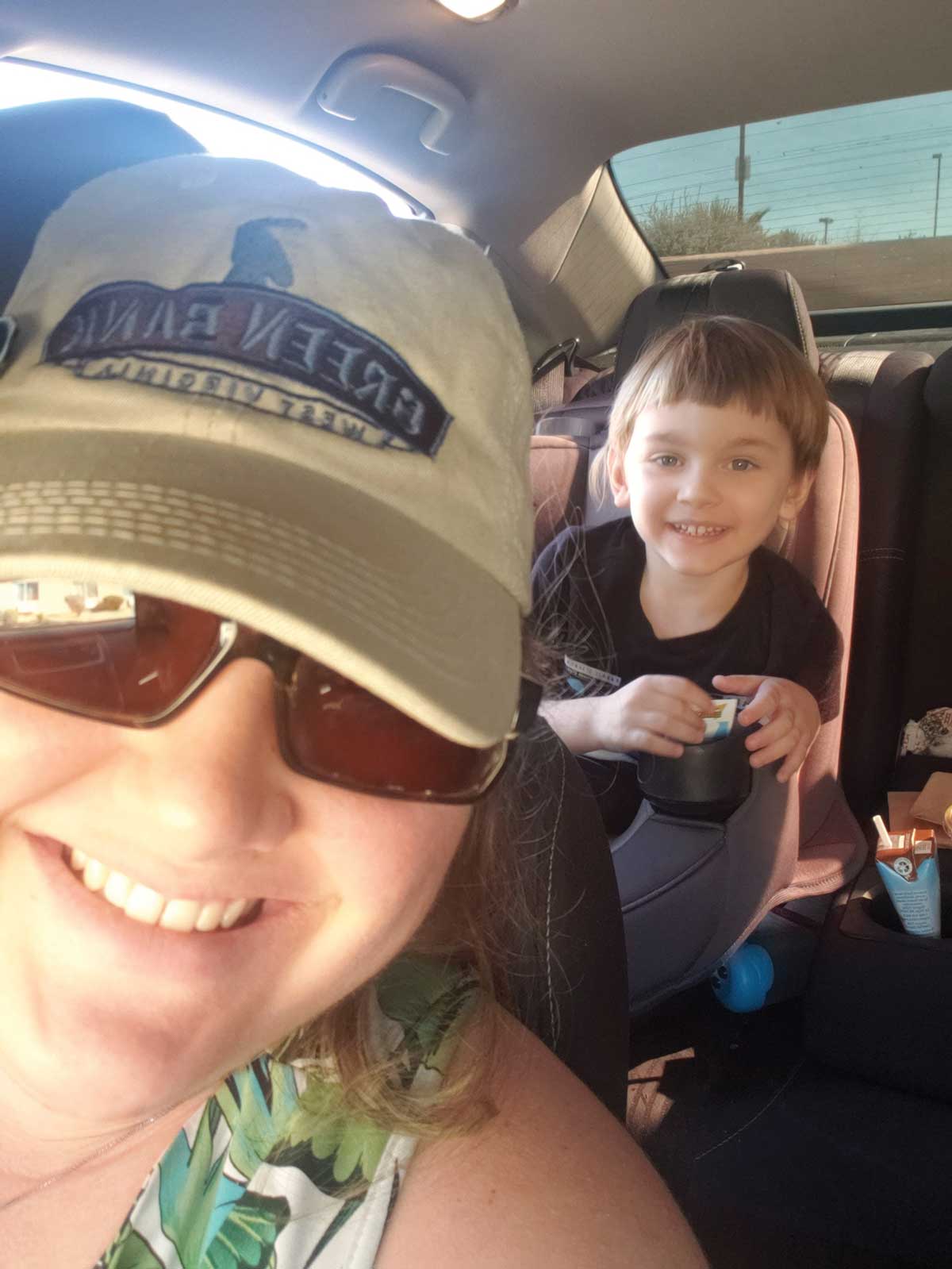
My son was four months old when I arrived in southern California. In the midst of learning how to be a grad student, I was also learning how to be a new mom, trying to navigate problem sets and breastfeeding. Eventually, my coursework turned into full-time research, and my son transformed from an infant into a toddler. I had some more time to breathe.
Being a grad student parent is hard, even with my husband being a stay-at-home dad. Southern California is expensive, especially for a family of three on one grad student’s income. We can’t afford childcare, and my ability to stay in graduate school has rested on whether we could afford housing. Even with these challenges, being a grad student parent has helped me take time to relax. Having decent work-life balance isn’t an option; it’s a mandate. My now 4-year-old needs me to step away from my work to play with him, go on a walk, or snuggle up on the sofa and watch movies.
When the pandemic hit, it became harder for me—like most other people—to be productive. Living in a small, two-bedroom apartment meant that my desk was in the family room. Every Zoom call, every writing spree, and every attempt at progressing in my research was done in the presence of my family. Any semblance of work-life balance I had before diminished, and I began working late into the night—sometimes until 3:00 a.m.—to get as much work done as I could before my son stirred from his slumber around 7:00 or 8:00 a.m.
I’m fortunate to have been able to move to south-central Pennsylvania to finish up my PhD remotely. I rent a large, three-bedroom apartment here for about what I paid for a small, Caltech-subsidized two-bedroom apartment in California. I miss my friends, the mountains, and the parrots in Pasadena, but I sure do love having my own office to work. At first, I was also excited to have a lock on my office door . . . but my son figured out how to unlock the door from the outside about a month after we moved in.
What imposter syndrome taught me
by Arundhati Deshmukh, University of California, Los Angeles, 5th year
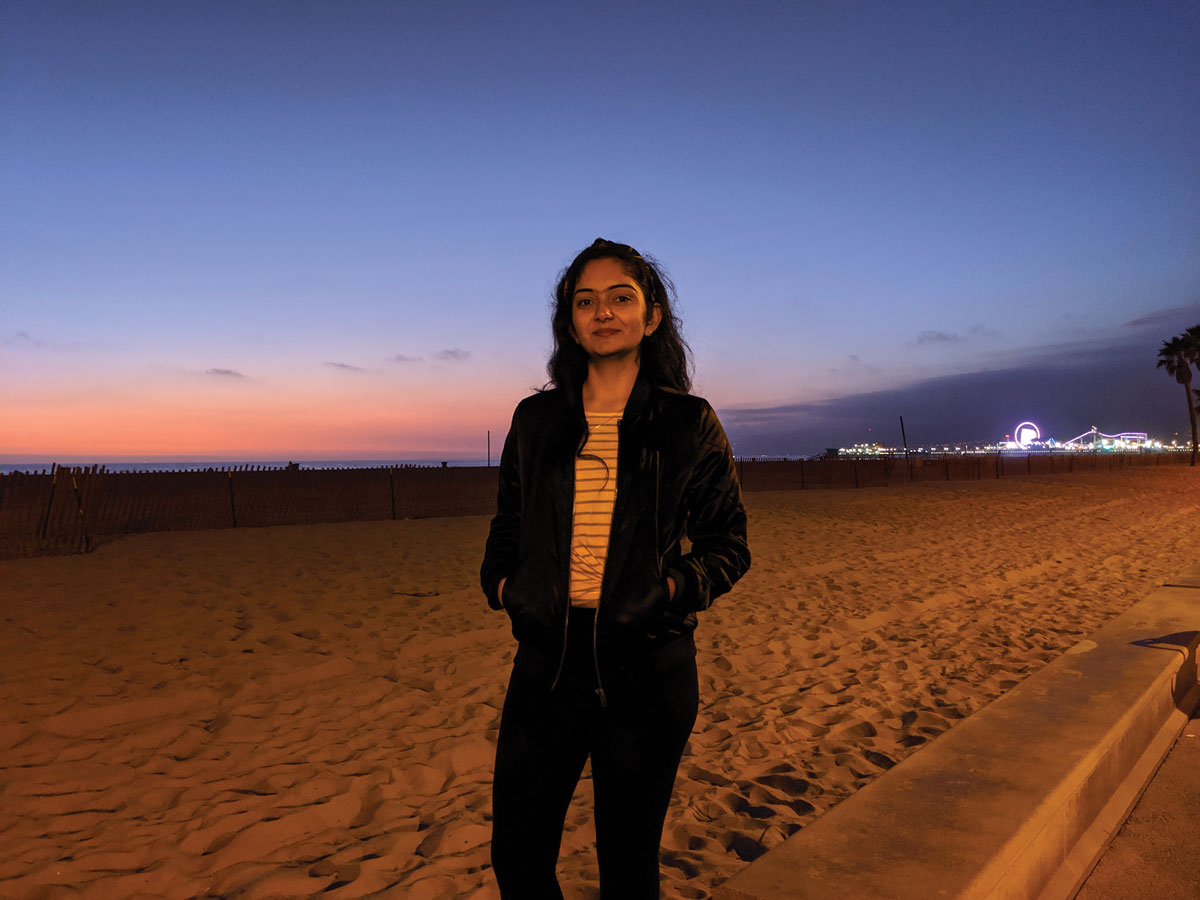
On the first day of graduate school, I had been in the US for exactly 4 days. I left my family, friends, and my home country behind and flew across the globe from Mumbai to Los Angeles. All on my own in a new country, I was naturally anxious, but also excited for this new chapter of my life.
Consumed with the pressures that come with the first year of graduate school, I began to believe that I was not as accomplished as others around me and would not survive here. It soon evolved into a lack of confidence like I had never experienced before. Although I did not recognize it at the time, I was going through imposter syndrome.
Fortunately, my peers and mentors helped me realize that I was not alone. I learned to speak up, and by sharing my experiences and listening to the experiences of others, I came to the revelation that we all have our ups and downs. It’s not our accomplishments but our experiences that make us unique. And comparing yourself to others is futile.
We need to keep this in mind as we navigate the uncertainties of the pandemic and the political climate. Academia can be a cold, harsh place where the pressure to perform is enormous and positive reinforcements are few. Now that I’m a senior graduate student, I try to pass on these lessons by helping and encouraging others. While I still struggle with my issues and I have no idea when I’ll be able to see my family again thanks to COVID, I do know that with the support of those around me, I will survive this long and arduous journey.
COVID-19 stole my sense of community. Here’s how I’m getting it back
by Aphra Murray, Georgetown University, 3rd year
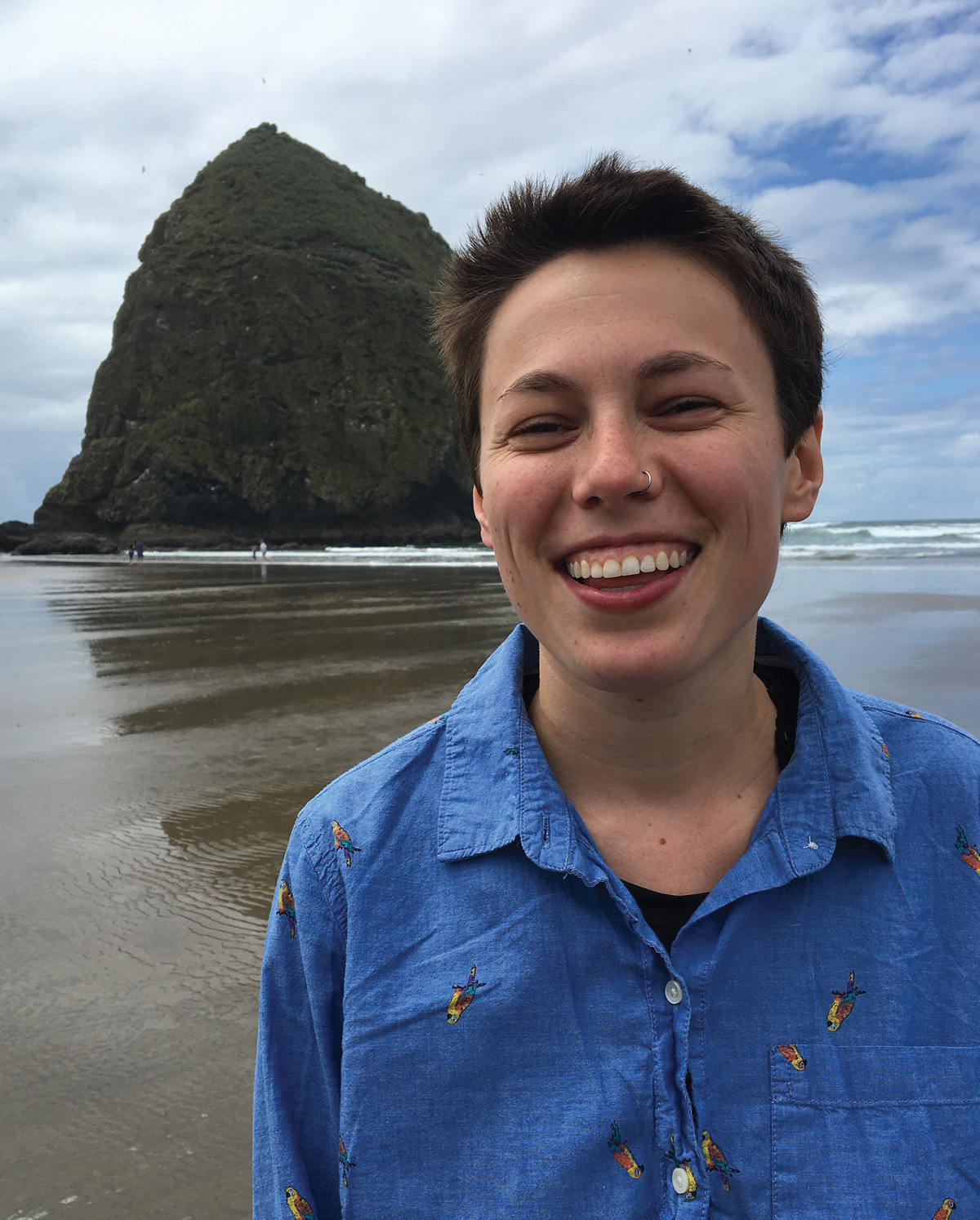
One night in November, feeling frustrated by the lack of progress on my research, I turned to my email and saw a message in my inbox from a faculty member with a story idea for Hoya Chimica, the Georgetown University departmental newsletter that I helped relaunch in August. The faculty member was excited about the work of an undergraduate researcher who had joined her lab remotely and wanted to share the work they had accomplished together. In times where working from home feels increasingly isolating, this was exactly the community engagement I had been craving.
When I first pictured my PhD program, I envisioned long days in the lab, painstaking processing of data and, if I was successful, writing papers for publication. The six months I have spent out of the lab due to COVID-19 have required me to reimagine what graduate school looks like. While I continue with research remotely, I find myself missing the other parts of grad school, parts I only discovered after arriving on campus. The weekly seminars over coffee and (free!) cookies, commiserating with friends about how cold the lecture hall is, or congratulating someone on a new paper I overheard them talking about at lunch. These are the grad school experiences that now feel distant in our new, virtual normal.
With our departmental newsletter, I hope to rebuild that sense of community not just for myself but for others who are missing this sense of camaraderie. Working on articles with undergraduates, faculty, and staff has given me an opportunity to meet people in our department with whom I have never worked. Creativity has always been at the heart of scientific progress, and I hope that this same passion for creativity can help us rebuild our scientific community.
The pandemic will end, but kindness doesn’t have to
by Sarah Anderson, Northwestern University, fifth year
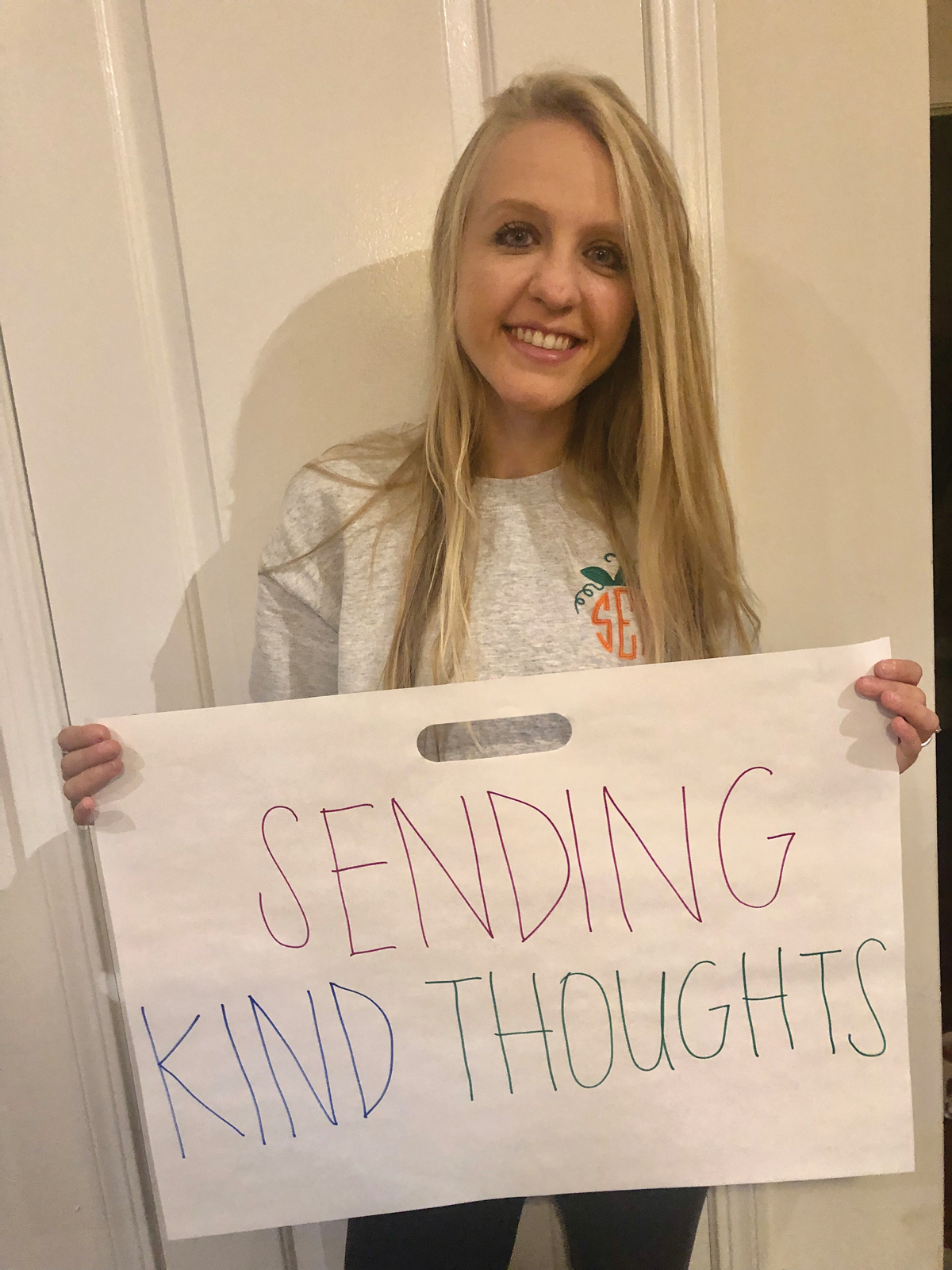
On the morning of Feb. 16, 2018, my heart stopped as the Taylor Swift song playing on my phone gave way to an incoming call from my mom. She never called me at 8 AM as I walked to lab. I picked up, and my suspicion that something terrible must have happened was immediately confirmed—a friend of our family had died in an accident. I cried, composing myself once I reached the lab. The day proceeded in a blur as I checked items off my to-do list. No one knew of any reason to ask how I was doing, and no one did.
I had long ago accepted the “strictly business” nature of my PhD program in which interactions were largely driven by the common goal of research. But the COVID-19 pandemic has shown me a different side to graduate school, one that is more aware of life outside the lab. Group meetings now begin with a check-in to see how everyone is faring. Most emails I receive contain well wishes. Students and department leaders are hosting virtual coffee and happy hours so people can share how they are feeling.
I realize that this sudden shift in attitude is a result of the visibility and universality of the COVID-19 crisis—we all know about it, and we are all experiencing it together. However, many people are enduring their own personal pandemics, ones that are far less apparent to others. Hardship, loss, and bad days preceded COVID-19 and will persist long after it’s over. I hope that our concern for emotional well-being will, too.
So keep asking your lab mates how they’re doing. Keep signing your emails with “Sending kind thoughts.” Keep having virtual gatherings with your colleagues to check in and reconnect. I know I would have really appreciated this extra bit of kindness the day my phone rang at 8 AM with devastating news.
A disorienting orientation
by Aaron Perez, prospective grad student
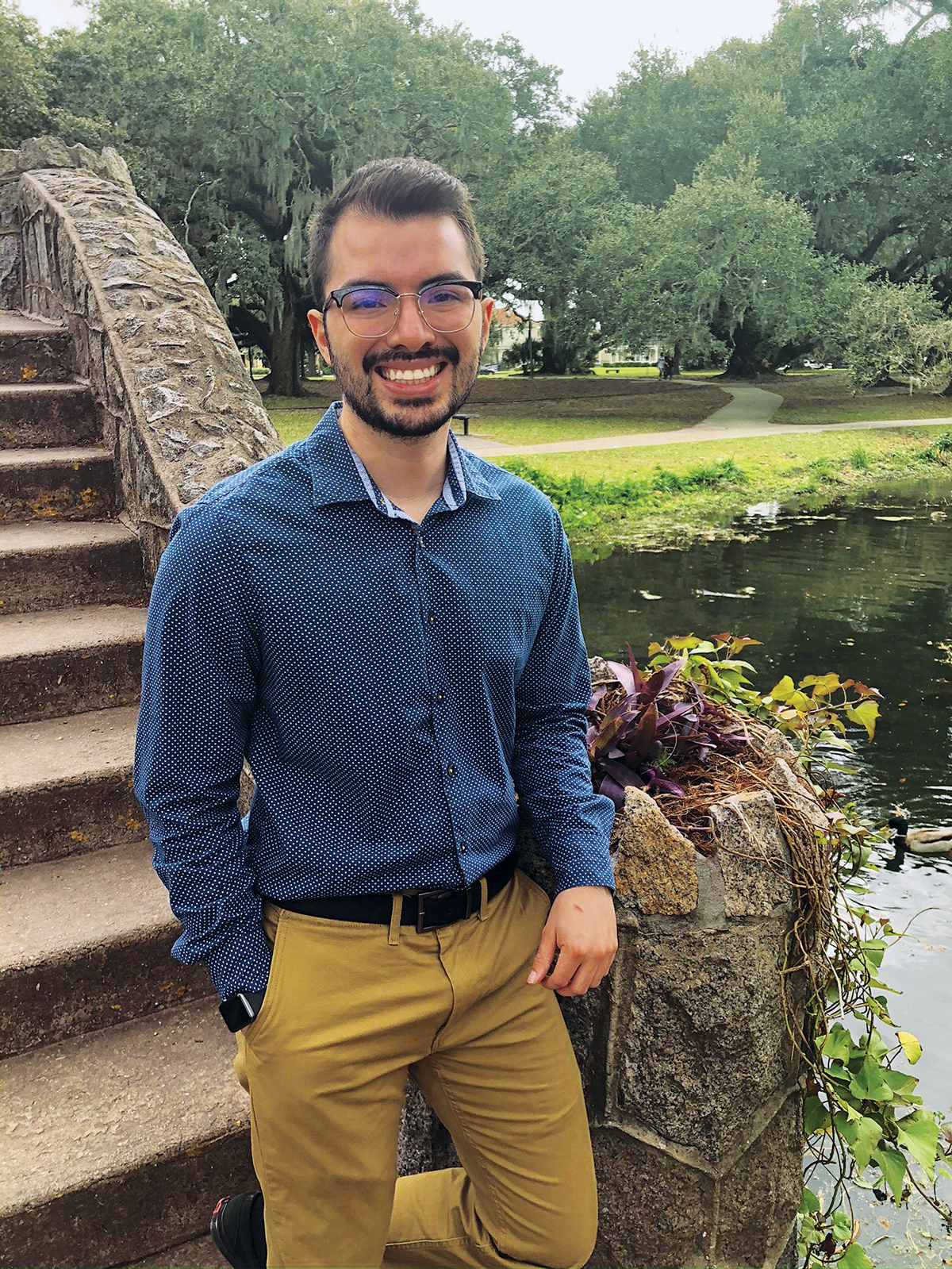
I finally did it! After 2 years of applying to different chemical engineering graduate programs, I was admitted to a university, and it invited me to attend its on-campus orientation. Little did I know that COVID-19 would impact the entire trip. Before accepting the invitation, I asked the graduate adviser if it was safe to travel to that state. The response I got was “Yes, we don’t have any cases here.” Although I was worried, I decided to pack my bags and travel to the university. I knew from the beginning that this trip would be chaotic. First, my flight was delayed for more than 3 h for additional temperature screenings. Second, several students canceled their visits, and my group decreased from 20 to 6. Third, several professors canceled their lab tours. This was especially disheartening because one of those professors was one that I was most interested in working with. Finally, the university dismissed everybody from campus, including prospective graduate students, leaving us all scrambling to get home safely. Now I am questioning my decision to go to graduate school. So far, the coronavirus pandemic has demonstrated that universities are not prepared for an event like this.
Synthesizing hand sanitizer
by Andrew Wang, University of Oxford, second year
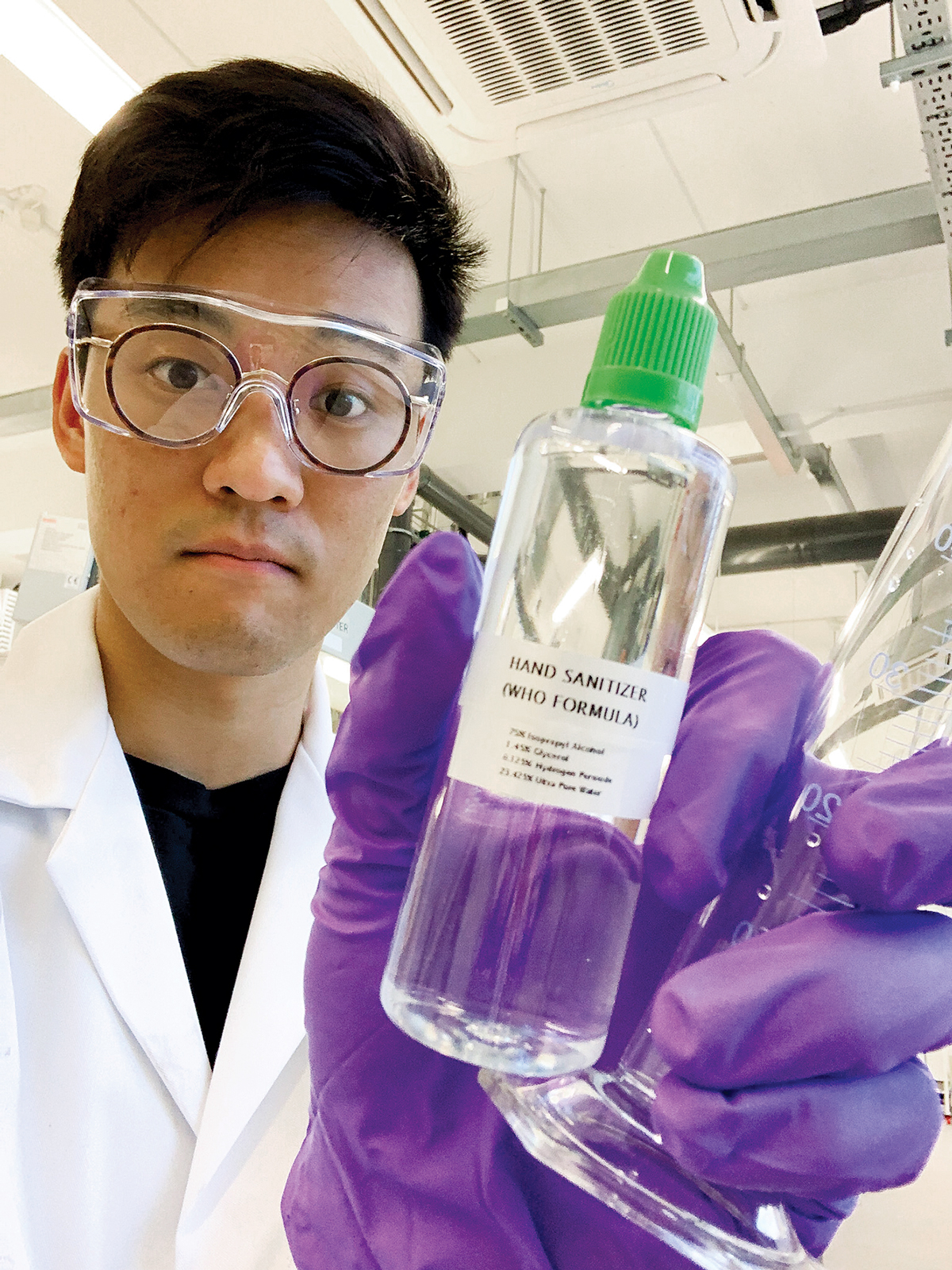
One strategy to keep COVID-19 at bay is frequent hand washing. When soap and water are not available, people should turn to hand sanitizers. But what do you do when hand sanitizers are in short supply? Fortunately, the World Health Organization (WHO) provides a recipe for making hand sanitizer. Having a bachelor’s degree in chemical engineering, I knew I could easily whip up a large batch with common reagents and share it with others.
Big bottle of isopropyl alcohol: check. Three percent hydrogen peroxide: check. Glycerol: check. Ultrapure water from lab: check. Glue-applicator bottles from an art store: check. Scents from a soap-making kit: now we’re talking. Precisely mixed with laboratory glassware, my “WHO artisanal” formulation was welcomed warmly by my lab mates and friends alike. Soon after, the campus was shut down, like many others around the UK.
Whether it’s immunology and infectious disease researchers sharing best practices, acquaintances giving masks to those traveling home, or housemates bringing supplies to those in isolation, we chemists are showing that even if we have to be socially distant, our community can still come together to support one another.
Learning new skills
by Stephanie Smelyansky, Massachusetts Institute of Technology, first year
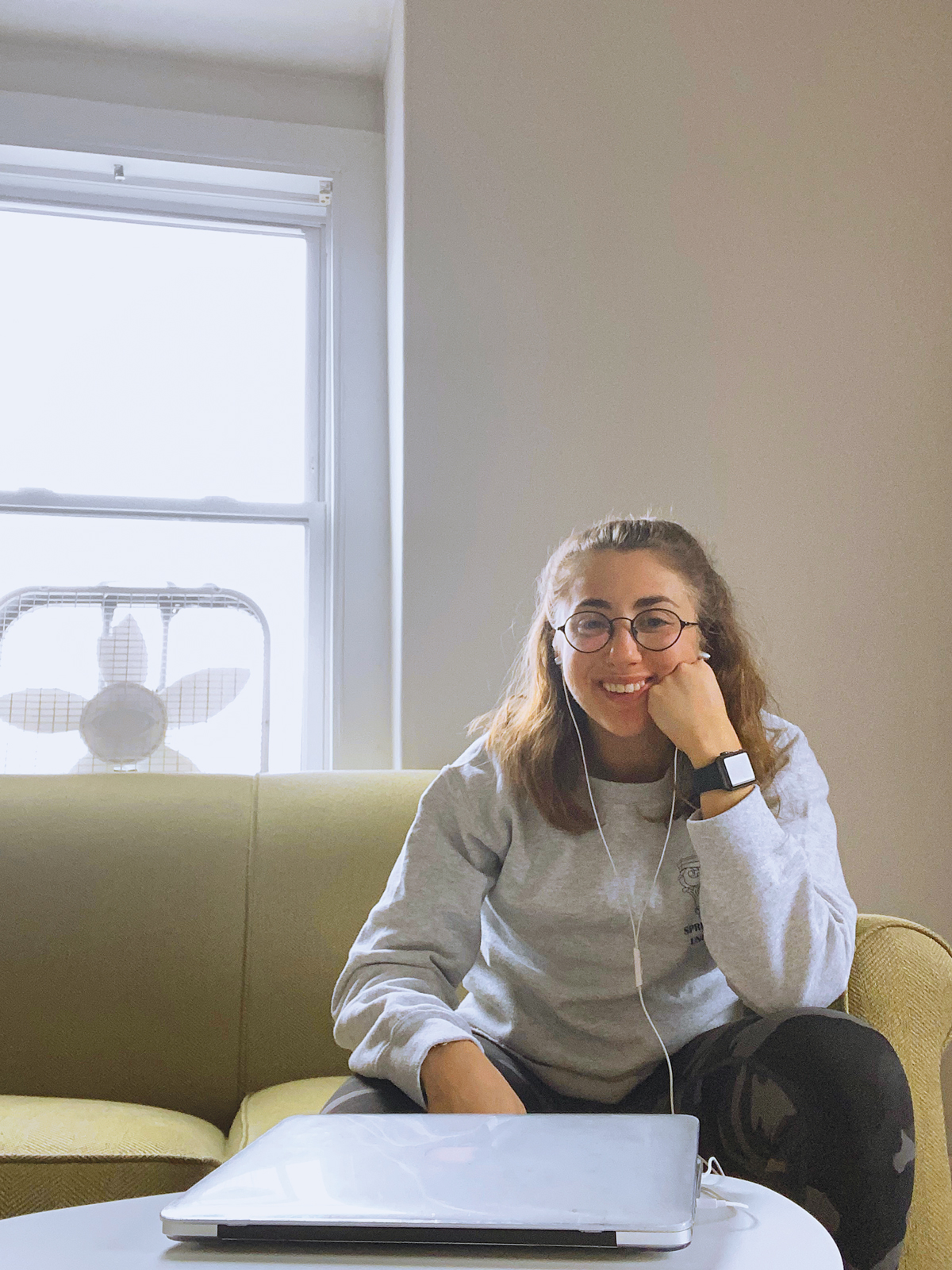
The past few weeks have felt like a haze, one that’s clouding my mind and making it difficult to concentrate on even the easiest tasks. In the past few weeks, I had to watch my undergraduate students panic about how they’re going to book flights home with little time and little money, or what’s going to happen to their visas if they return to their home countries, all while explaining to them how to do videoconferencing for class. At the same time, I helped my lab mates shut down our lab and said goodbye to friends as we descended into a new regime of social distancing. The most painful part is I have no idea when I’ll see any of these people again in person. Despite everything that’s happening, graduate students are still expected to make headway on research and continue teaching. But I’m a chemist who makes molecules, not Word docs, for a living, so it’s hard to be productive from home. I’m focusing on learning new skills, such as programming and reading up on current literature in my field. I also chat regularly with my adviser and lab mates over Zoom, discussing recent papers or ideas for new projects in the lab. However, it’s incredibly difficult to concentrate on teaching and research when the mental and physical health of my students, friends, and family is at risk. It feels like my life and career have been put on pause, and I’m just treading water while waiting for the world to hit play again.
Postdoc dreams deferred
by Shreya Ghosh, University of Pittsburgh, fifth year
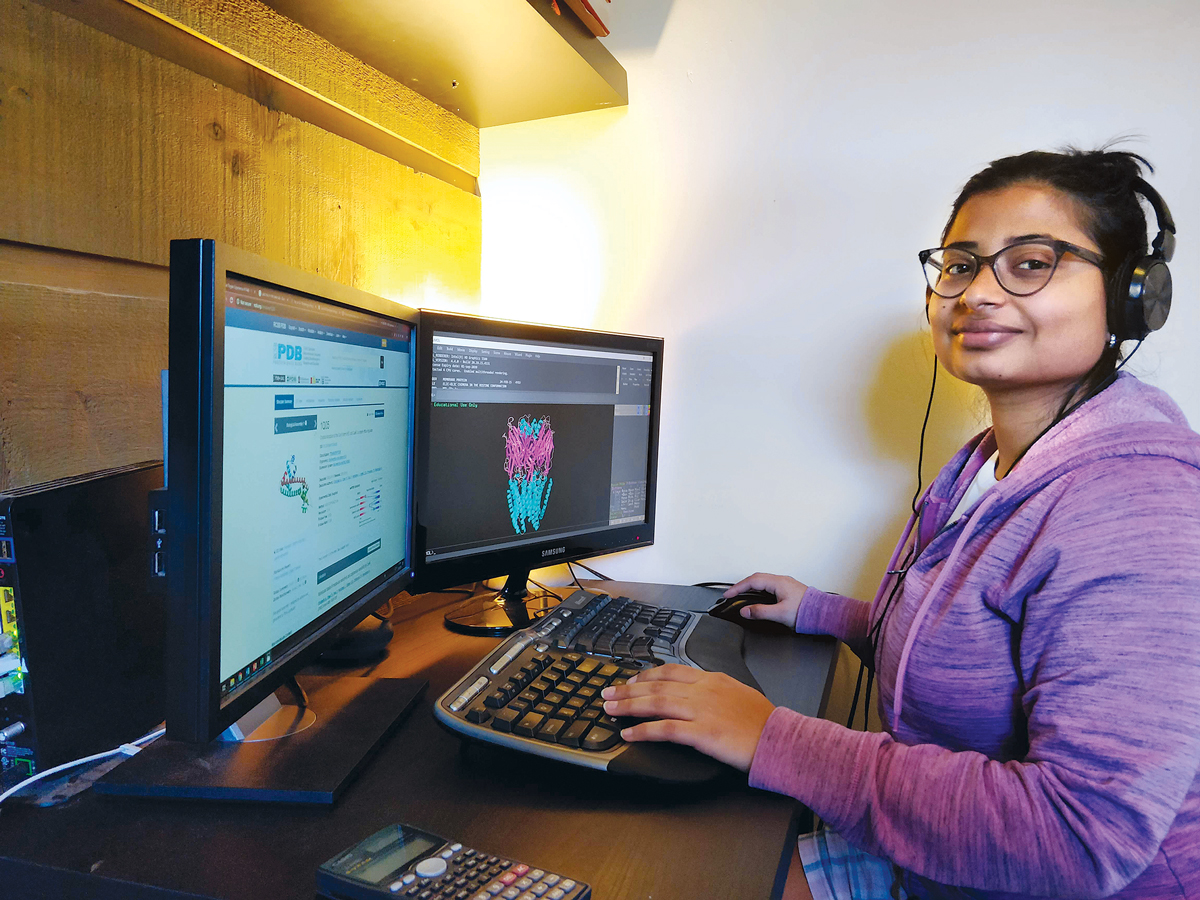
After I graduate this summer, I plan to do a postdoc, for which I have been applying since January. I have done a lot of Skype interviews. A few prospective mentors were impressed enough to invite me to their labs to give a talk, check out their facilities, and talk to other lab members. This is an absolutely crucial step, since I will be working in their lab for the next 2–3 years. Now with COVID-19 surging, all those prospective mentors have postponed talks until May (provided things are normal by then). This means I will not have an offer before June. I am an international student on a visa, and I need to have a job offer by the time I graduate, which now could be delayed by a semester. I also need to apply for work authorization and other paperwork. Applying for a postdoc is challenging enough, and COVID-19 has only added to the stress. I have asked my current principal investigator if he could keep me longer as a graduate student in case things don’t work out. He has agreed to it, but that would put a strain on his research funds. This whole situation has thrown my career and future into uncertainty.
Staying put
by Ngee Kiat “Jake” Chua, University of New South Wales, fourth year
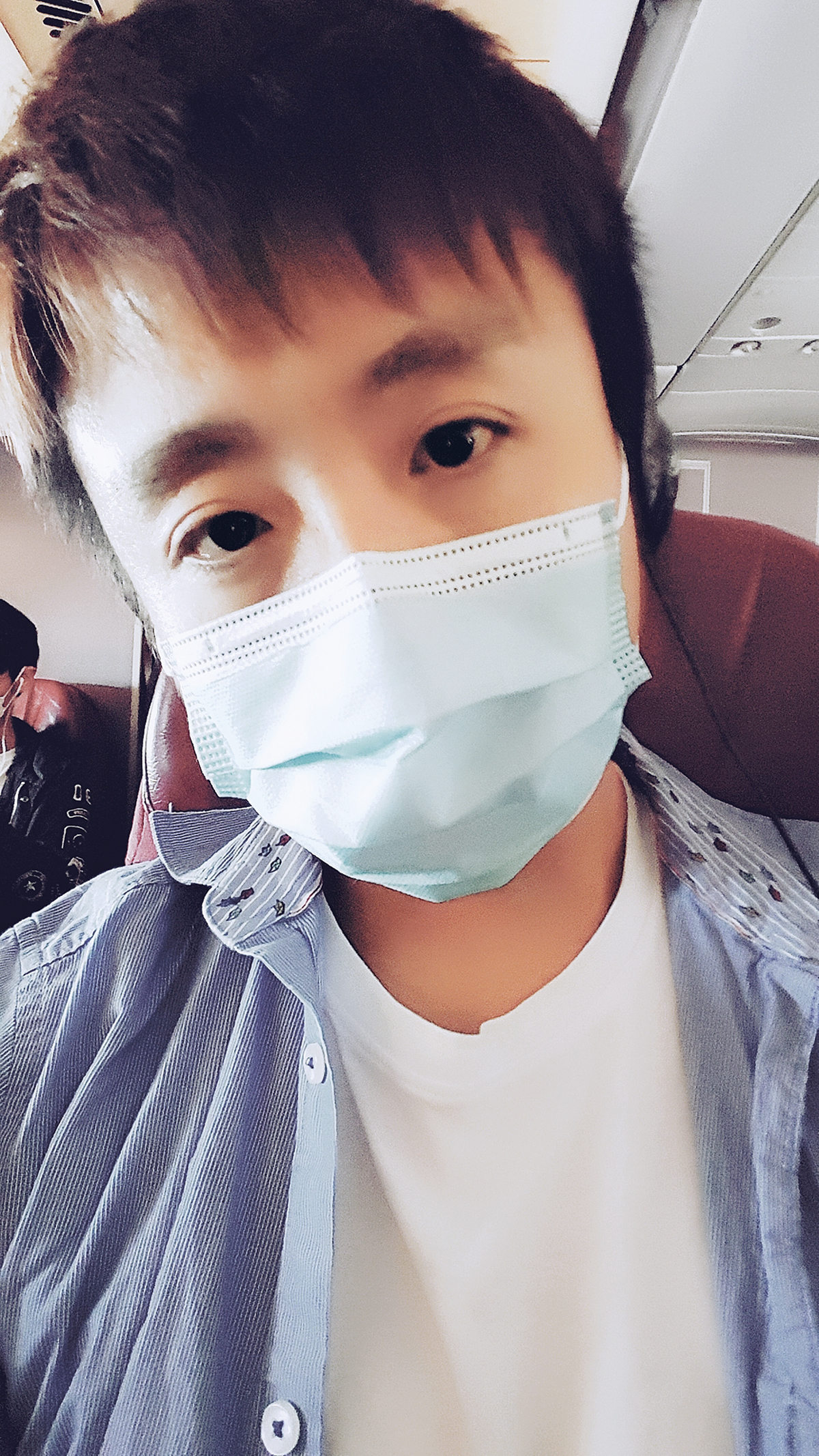
One of my biggest worries during this pandemic is not the virus itself. I fear wearing a mask or even going outside because of xenophobia around the origin of the novel coronavirus, SARS-CoV-2. What if I’m one of the unlucky ones, getting punched or receiving nasty racist remarks? The infamous case of a beaten-up Singaporean international student in the UK makes me cautious as I walk the streets as a Malaysian Chinese in Australia.
Another worry I have is for my future. I recently got accepted to present my first oral talk in the US and received a travel award to boot, which was exciting! However, the conference was canceled. This conference was a major turning point as I approach the end of my PhD with nine publications. I recognized names in the field, and some of them recognize my work (though I’ve not met them). Furthermore, I was more knowledgeable and competent than when I started grad school. “I’m ready; it’s now or never!” I told myself. I could network for jobs and finally engage with scientists who cite me (whom I happen to idolize). Regrettably, it is the final year I’m eligible for a graduate student travel award to the US, and this would have been my first time talking about my PhD work to an international audience. Although this missed opportunity hit me hard, I’ll have to work out alternatives around the impacts of COVID-19.
Study abroad cut short
by Barbara Preti, University of Bern, third year
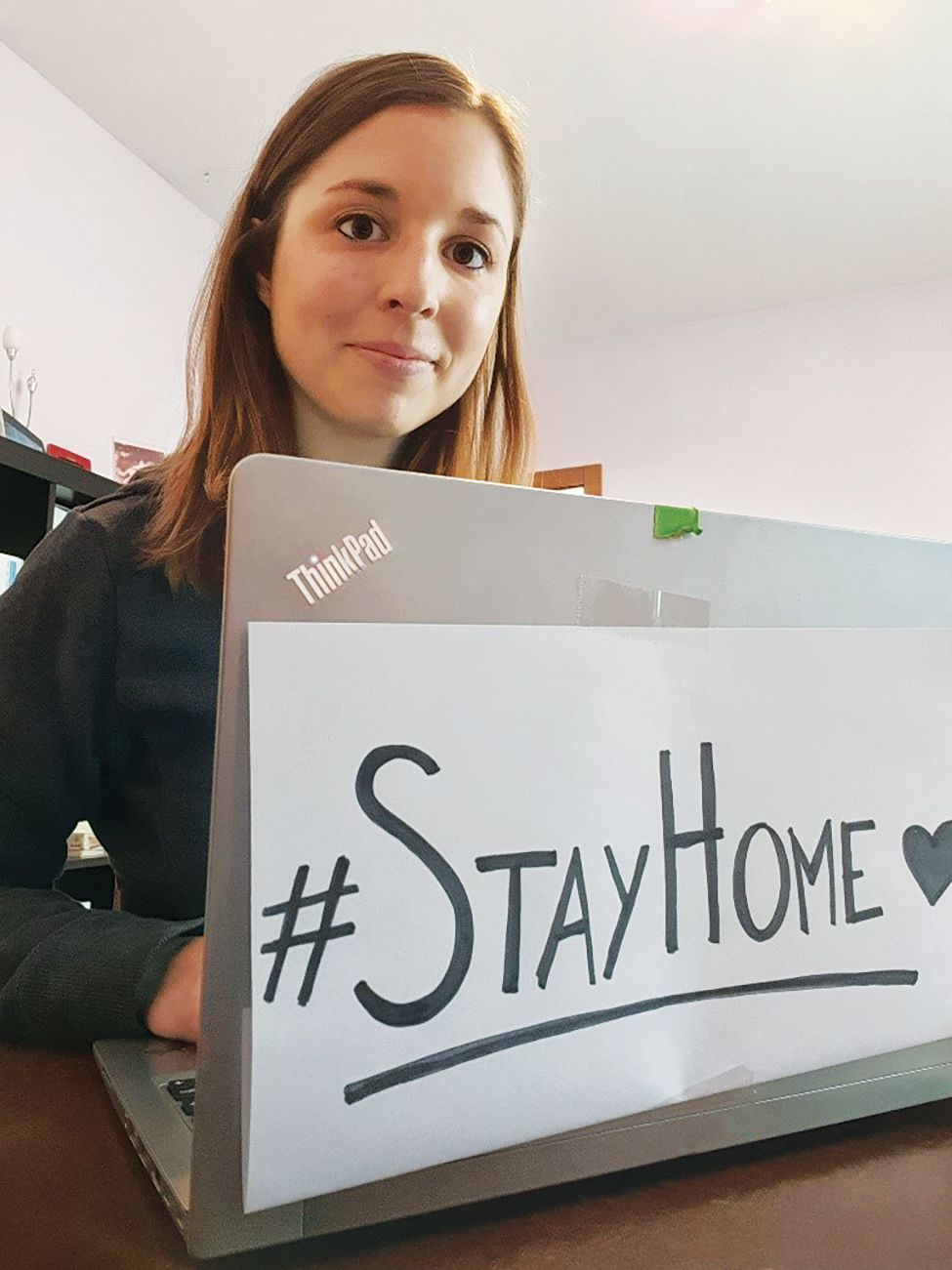
In December 2019, I received an award letter from the Swiss National Science Foundation saying that I had obtained a fellowship to spend one year of my PhD studies at the University of Southern California. I am a chemical biologist, and I have always wanted to study and work in the US. On Feb. 24, I flew to Los Angeles, thinking that I had left just in time, since cases of COVID-19 were beginning to spread in Europe. I started to work in the new lab under the supervision of a very knowledgeable and kind postdoc who was able to teach me a great amount of new techniques in only 1 week. But then COVID-19 began spreading in the US as well, and my supervisor suggested I return to Switzerland. After 10 amazing days in the new lab, from both a scientific and personal point of view, I had to interrupt my stay abroad and fly back to Switzerland. In just a few days, my biggest dream became a nightmare. Now I am working at home, waiting for the day I can pursue my dreams of studying abroad.
Defending virtually
by Mark Mantell and Lindsay Michocki, University of Michigan, fifth year, engaged to be married
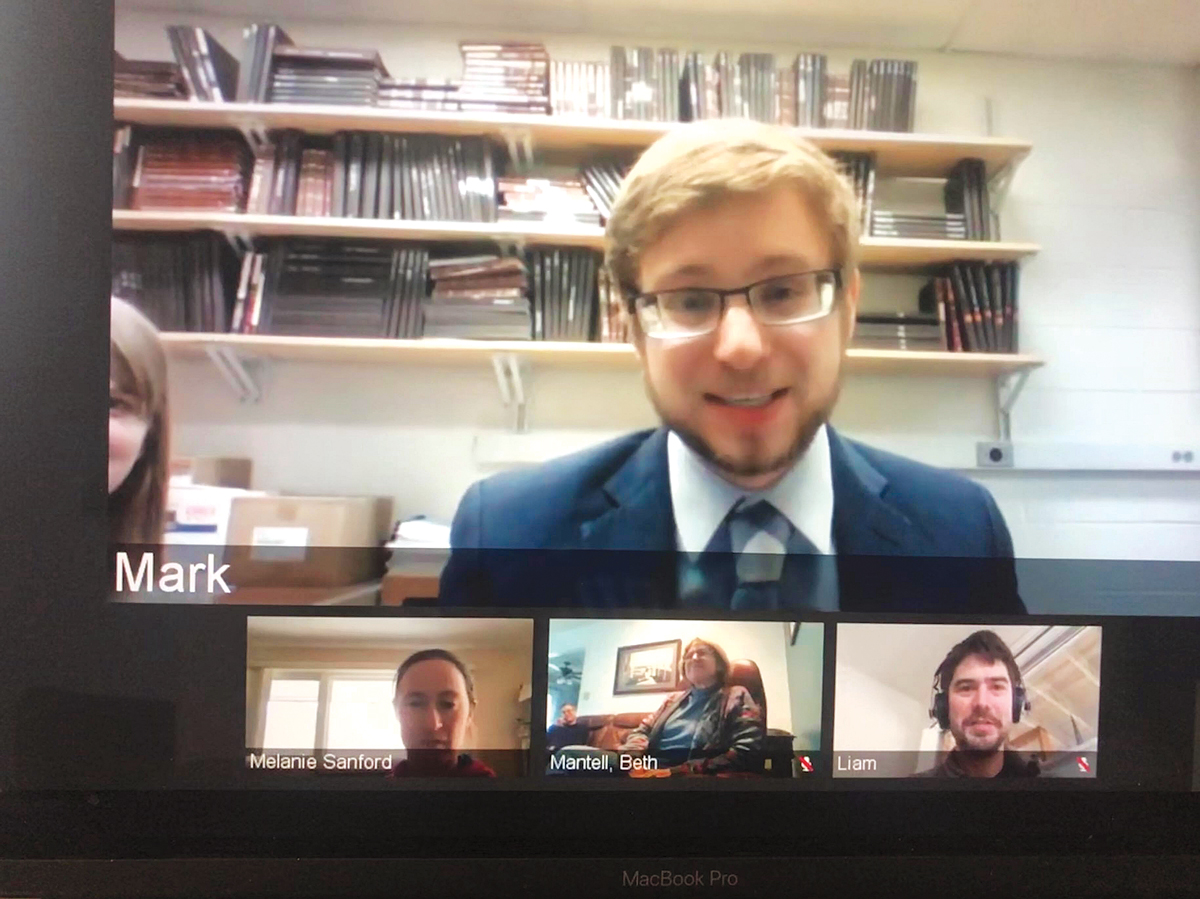
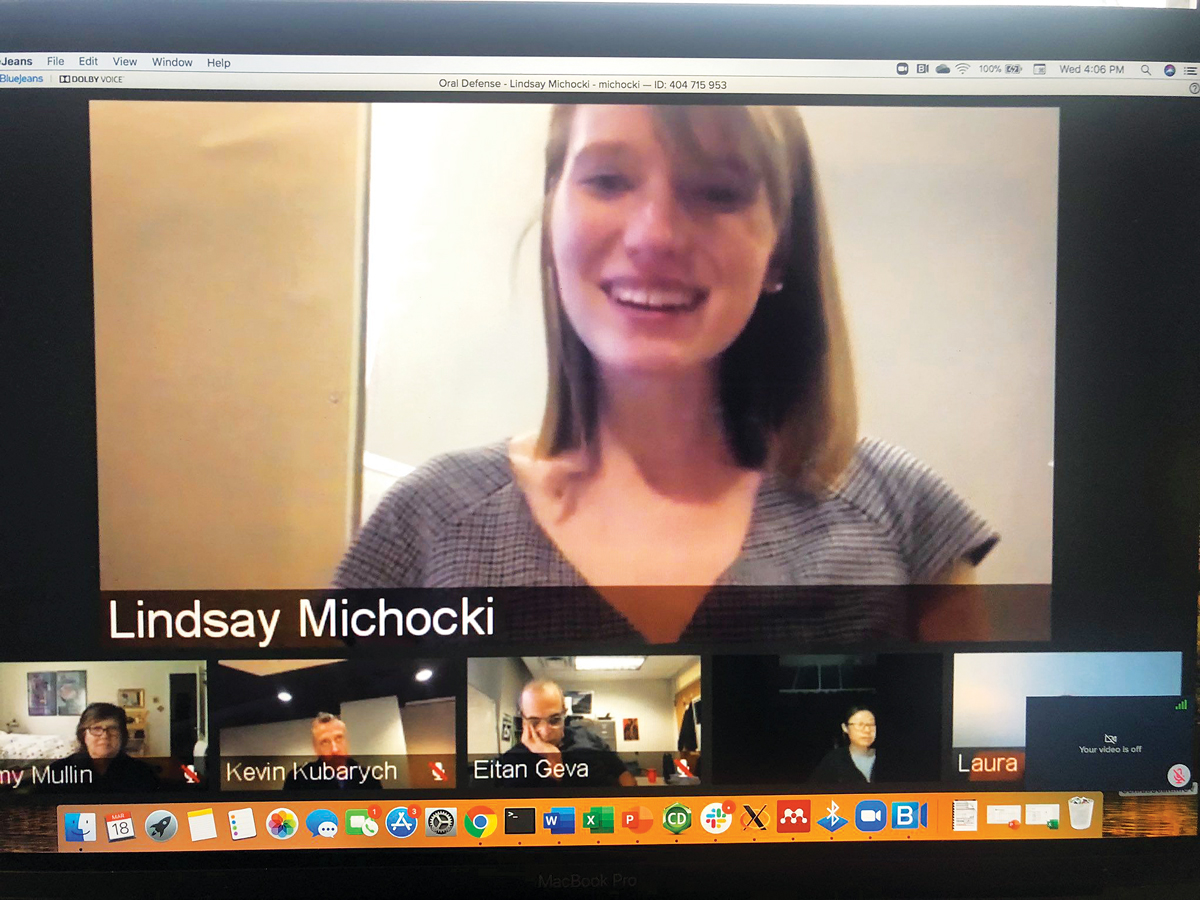
After carefully planning to have our defenses on the same day so that we could have family and friends easily attend both, we were disappointed to receive the news that the University of Michigan would be switching to remote defenses, forcing our loved ones to cancel their travel plans. We didn’t have much time to linger on the disappointment, though, as our focus shifted to adapting our presentations to be done virtually and working out the technicalities of the remote defense. Each of our defenses was held with just us and our principal investigator in the room, and everyone else was online. Despite how frantic it felt in the lead-up, the defenses themselves went remarkably well—and were free of technical difficulties! Everyone was incredibly kind and willing to adapt, and we still even got to have out-of-town loved ones attend the defenses—just virtually! Despite how odd the circumstances were, the defenses still felt like a major and special accomplishment, complete with our audiences joining us for a remote champagne pop and toast. The closure of all nonessential research was announced during Lindsay’s defense, effectively closing the building. It was a fitting cap to a week that felt completely surreal and still remarkably heartwarming.
Commencement ceremony canceled
by Isabel D. Colón-Bernal, University of Michigan, recent graduate
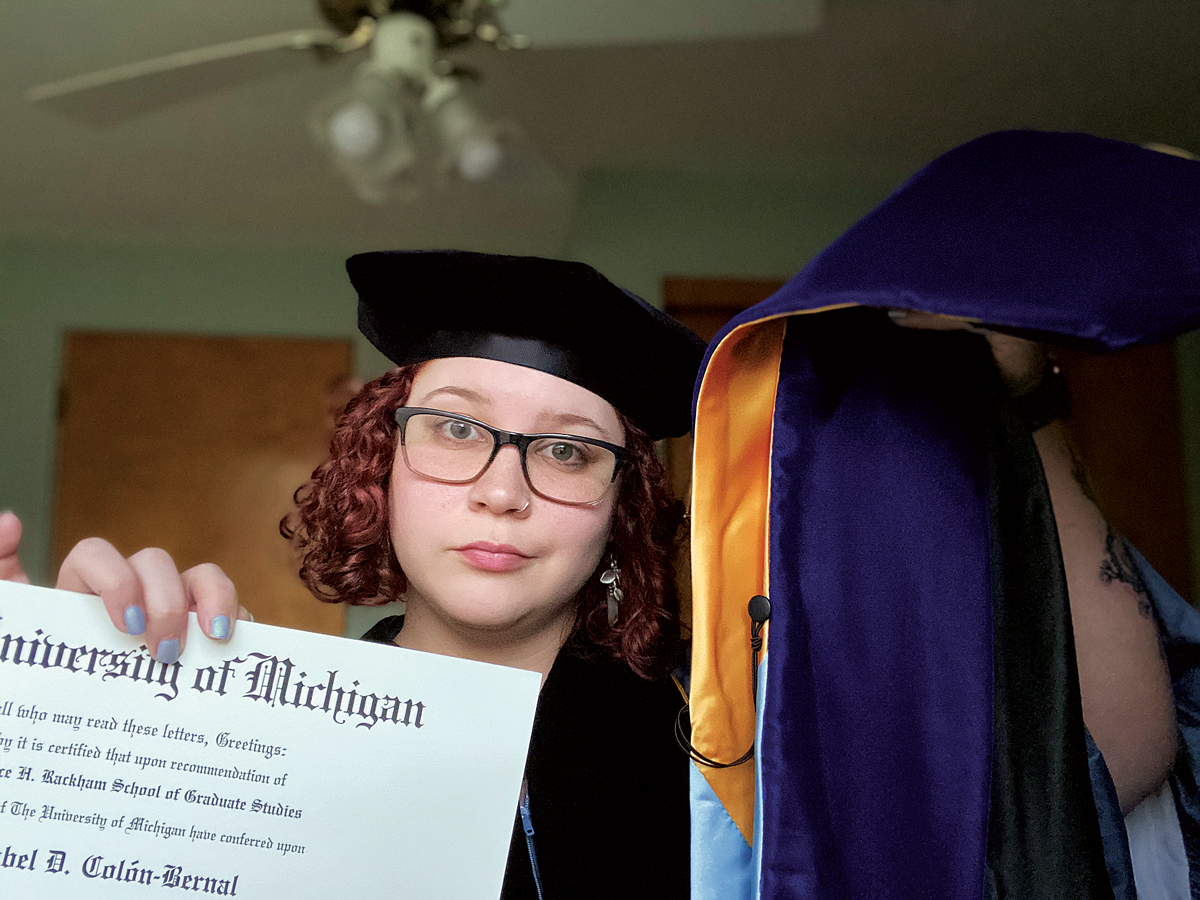
As I’m scrolling on Instagram to unwind from my busy day, I come across a statement from the University of Michigan. The university has decided it is best to cancel all commencement ceremonies. My immediate reaction is, “Oh no, this is what I feared. My parents won’t even get to see me walk.” This breaks my heart because they did not see me defend my PhD dissertation. Commencement would have been the day they would see how all my hard work and moving to the US were worth it—all those years they have missed me, wished I were there next to them at dinner, and all the holidays I missed because I was achieving my dream.
Despite obtaining my PhD in the summer of 2019, I’ve always thought of graduation as the culmination day, this phase of my life coming full circle; it’s a day of celebrating hard work, achieving dreams, and defying the odds. I’m not sure when I created this elaborate depiction of graduations. Is it the cultural influence from growing up in Puerto Rico, where we perceive graduations as an honor and a privilege? Is it the fact that I did great in school and was always highly recognized? Or could it be that they have always served as motivation, end points that I could refer to in hard times?
Commencement would have been the day I could say: “Mami y Papi, I did it!” Now I don’t know when or if the day when I will be hooded will come.
Managing depression
by Xiaofei “Fay” Lin, University of California, Los Angeles, fourth year
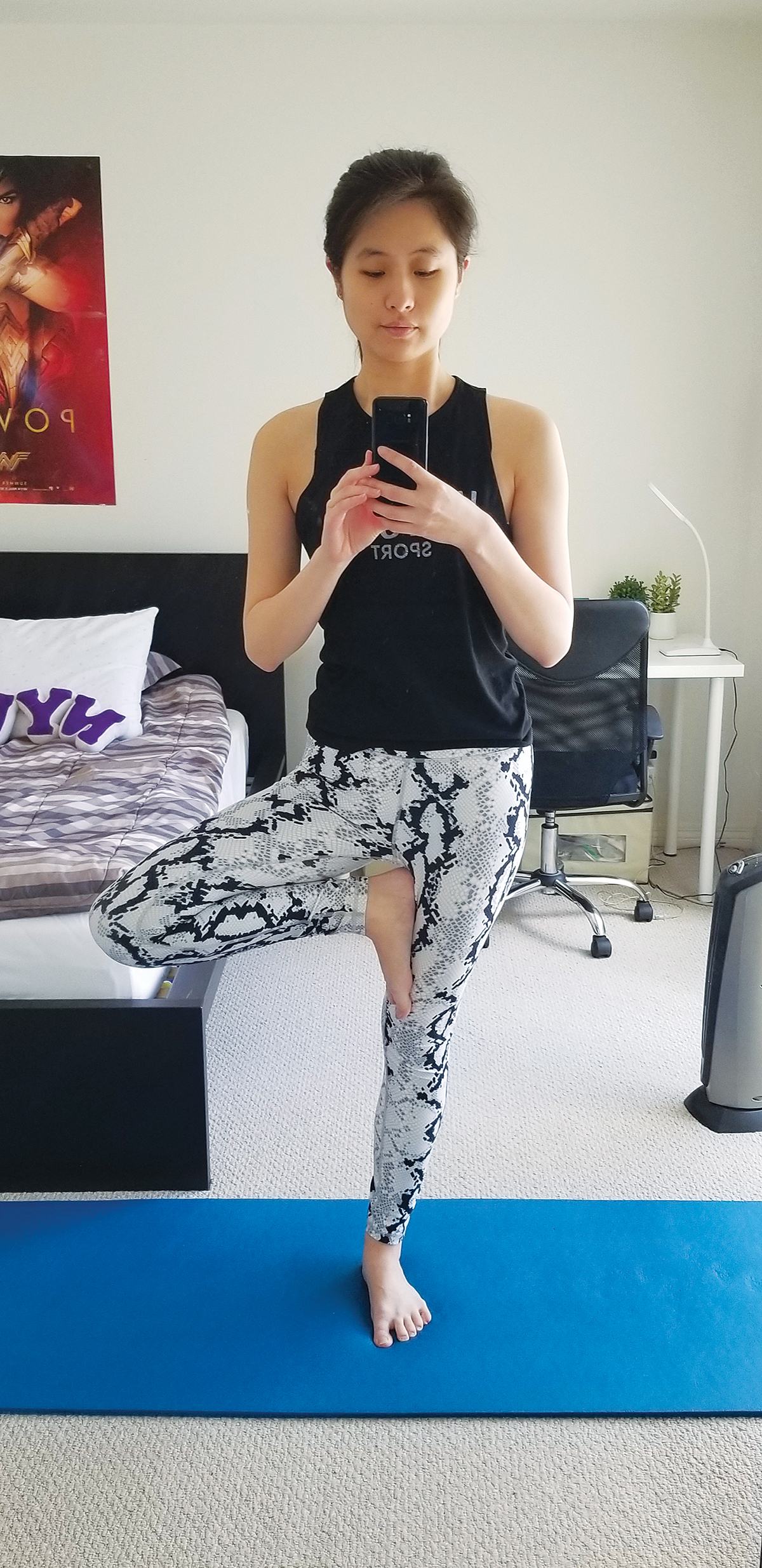
I struggle with major depressive disorder, and social distancing for COVID-19 has greatly challenged how I manage my mental health. As a grad student, my research is 100% computational and can easily transition to remote work, but staying isolated at home worsens my depression, and that puts a damper on my productivity.
But I’m realizing that social distancing does not have to mean social isolation. For example, I schedule morning video calls to motivate myself to wake up for a timely start to my day, and video calls throughout my week help me keep in touch with friends, family, and colleagues through informal chats and wellness check-ins.
Also, gym closures do not mean it’s game over for physical exercise. I started focusing on my at-home yoga practice and going on runs outside where there’s a scarce amount of people.
Finally, I’m being kind to myself even when research pressure is not. Graduate students have always faced pressure when it comes to research productivity. Much of that pressure remains during COVID-19 in the form of strict deadlines and stigma against “taking breaks” in academia. I remind myself that a global pandemic is not normal, and it’s OK if you’re not productive. While I’ve implemented methods to adjust to social distancing, there are some days when it’s still hard, and I’m just making it through each day. And that’s OK.
Starting a new chapter in Wuhan
by Bin-Qing He, Central China Normal University, third year
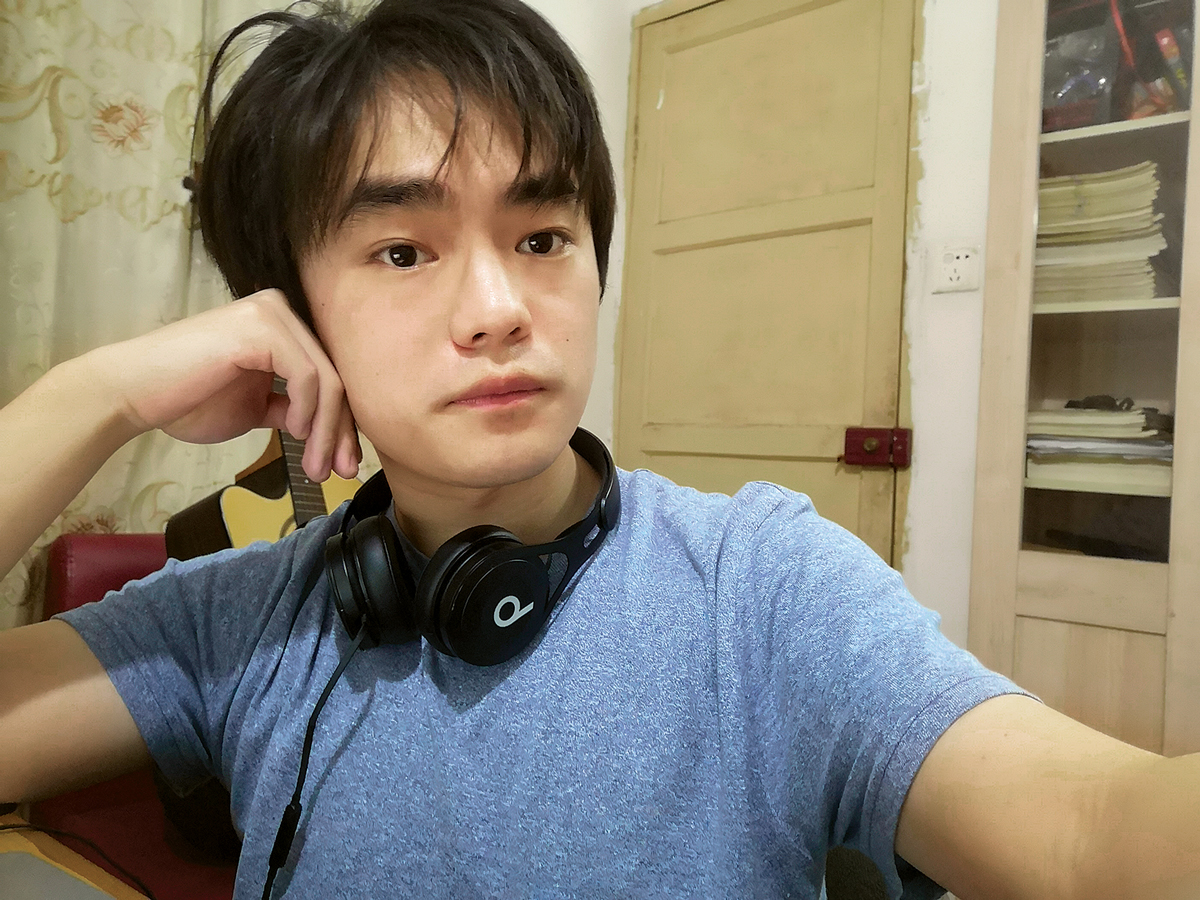
I would never have believed it if someone had told me that a city with the population of nearly 11 million could be shut down within such a short period, but just over 2 months ago, it indeed happened to my beloved hometown of Wuhan. Given the very nature of the coronavirus, extra caution was needed in my daily life: wearing a mask when going out, disinfecting myself when coming back, buying food online.
Besides worrying about the virus and keeping food on the table, keeping my sanity suddenly became a problem. Polishing my thesis, exercising regularly, and listening to music all became indispensable parts of my schedule. Additionally, the virus didn’t stop me from sharing ideas from newly published papers during group meetings using WeChat.
Fortunately, Wuhan’s shutdown has been lifted, and the restrictions are gradually being abolished, thanks to a lot of dedicated people. I am so glad that we finally made it this far. I sincerely wish the same triumph for the rest of the world.
When a distraction becomes a dissertation
by Jessica Martin, University of Connecticut, fourth year
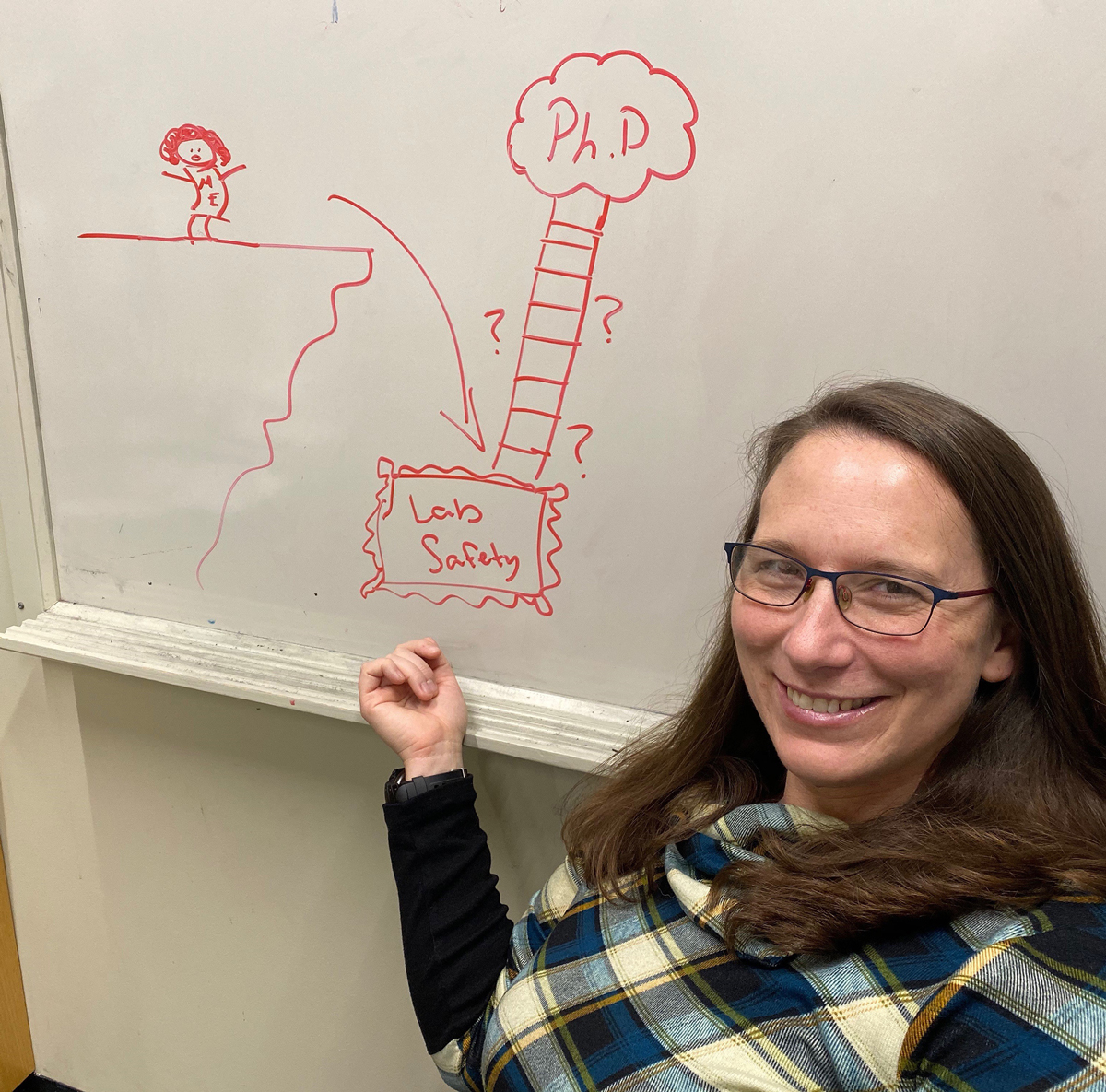
I may not get a PhD in chemistry. After passing my qualifying exam and winning a National Science Foundation Graduate Research Fellowship, I was able to plunge into my thesis project. That was when I discovered that I found my project uninspiring and began seeking out distractions. One distraction was analyzing safety and hazard assessment within the work of chemists. I have struggled with the dissonance between industry calls for strong safety cultures and the revelations of disastrous industry misconduct. This prompted questions about how academia prepares PhD chemists, what skills are emphasized, and how hazard assessment of the chemicals we create should be included.
As I have pursued these ideas, I have had enthusiastic discussions with people throughout the chemical world who believe this work is necessary. I have gained fantastic mentors eager to engage in ways I never experienced with my previous project. This work became my focus, leaving no time for my official project.
My department has been remarkably supportive as I have changed my thesis to hazard assessment and peer-to-peer education within a graduate program. However, there is a debate brewing over what my thesis will look like come judgment day. There is the distinct possibility that it will be determined that this work does not add up to a PhD in chemistry. Even if it does not, I will walk out with a body of work of which I am immensely proud and connected to a community that is doing work that inspires me.
Learning to balance life in graduate school
by Kristina Lenn, University of Michigan, Third-Year
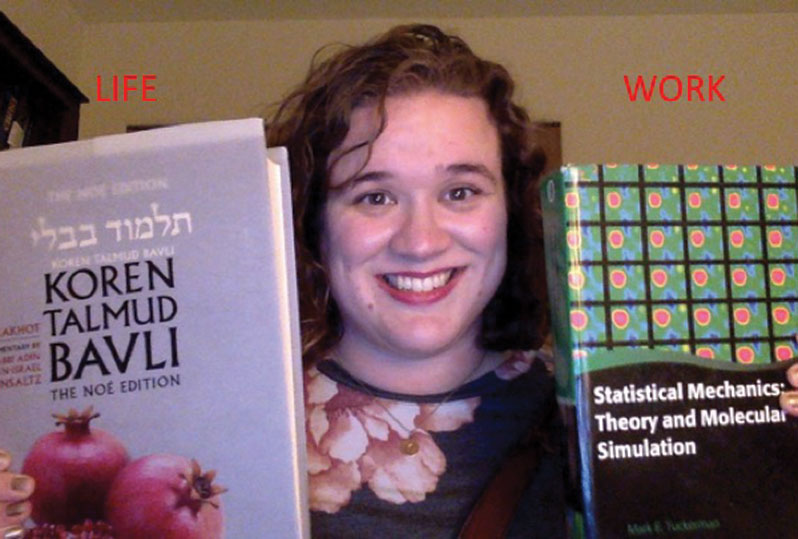
Graduate school appears to be a double-edged sword: it is the birthplace of expertise and the murder scene of well-rounded interests. It is where we contribute to society’s progress while forgetting our own progress as multifaceted individuals.
While this description is not 100% accurate, it is true to an extent. My fellow graduate students and I have many interests outside of our research and etch out some time to pursue them. But it is a difficult balance of focus. While I’m doing research, I think about writing a new article or reading a good book. If I’m doing one of those things, I worry about my research progress.
Don’t get me wrong; I love my research. I’m working on analyzing the quantum dynamics of charge transport in photosynthetic reaction centers, which will help propel solar-cell technology forward. This is something I’m passionate about, and I’m anxiously waiting for when I will finally put my stamp on this field.
Sometimes I feel giddy over all the possible career paths I can pursue when I graduate. But I also worry that with such a singular focus in graduate school, I won’t have pursued all of my passions, and I will have even less time for them when I start my career.
I try to balance my time, which is a lesson everyone has to learn. To read more, I started carving out time to read as much as possible on whatever topic is currently catching my fancy. To write more, I joined MiSciWriters, started two blogs, and am in the process of initiating a new blog. And to travel more, I’m planning a European tour after graduation.
While learning this balance, I have also realized that graduate school has provided me with the avenues to pursue my other interests. It has opened more doors than I could fathom. And even though it’s a difficult balance, I wouldn’t have it any other way.
The expensive toll of expense reports
by Connor N. Woods, University of Pennsylvania, fourth year
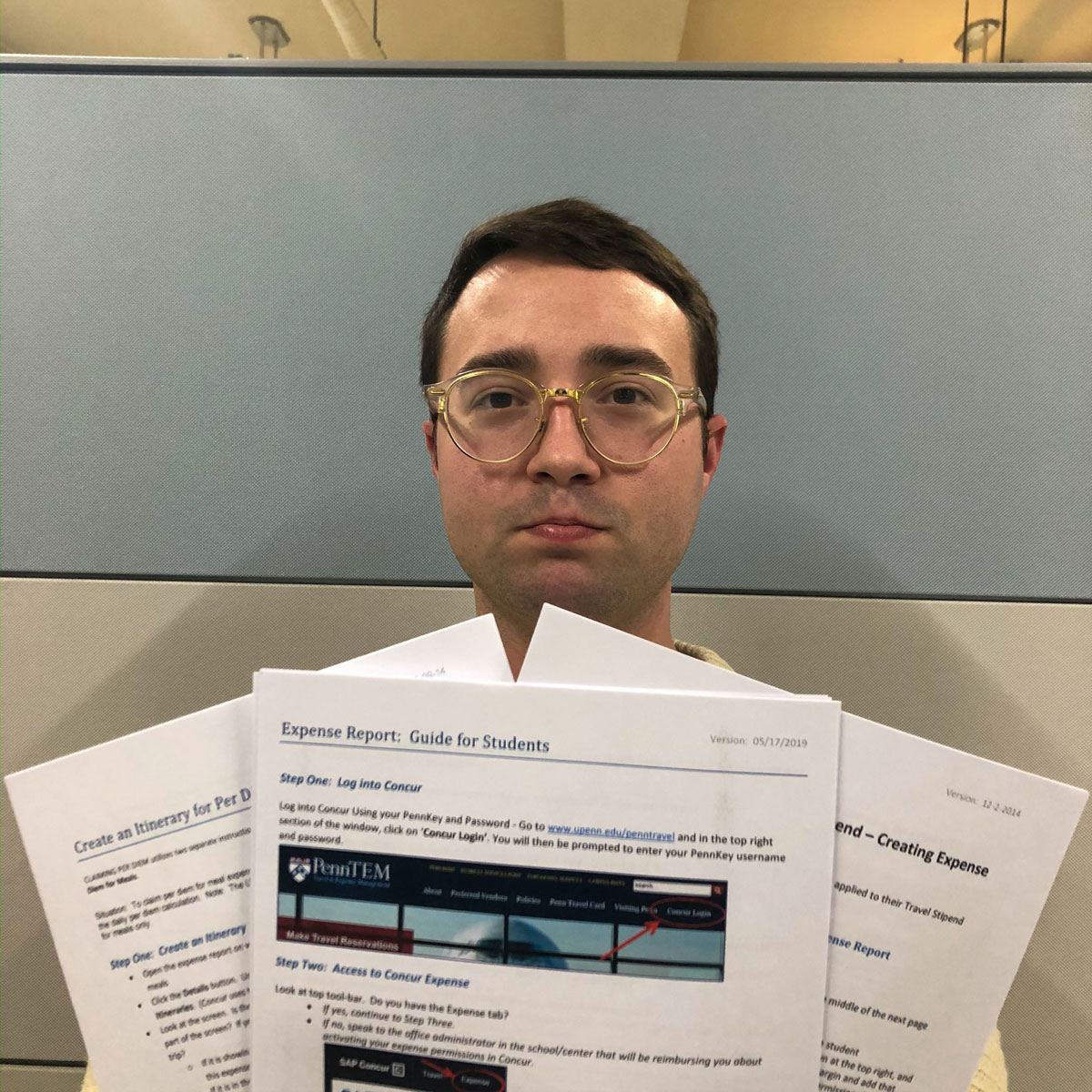
There’s a hidden financial burden in graduate school that no one prepares you for: the dreaded reimbursement process.
I had prepared to support myself on my stipend. I knew I wouldn’t be making a lot, but it would be a livable wage. What I had never thought to consider was that sometimes business culture in universities dictates that I would personally be expected to spend more money than I made in a month on business-related expenses over the course of a few weeks.
Many of us have to deal with expense reports at some point. For example, you might be expected to plan and pay in advance for travel to a conference. Other times, you might take a visitor out to lunch and pay for the large meal on your own. It’s supposed to be OK, though, because the expenses will be reimbursed. However, this process isn’t so simple.
First, we are expected to pay large sums of money that we simply might not have access to up front. Then we have to figure out the expense system on our own or through word of mouth because, despite being trained on proper waste disposal within seconds of beginning our graduate career, we never receive any training in this critical area. We then have to wait for the already burdened business office to evaluate the report and decide whether to accept or reject it. Finally, we have to wait for the funds to be dispensed.
The process can easily take a month. After all that, sometimes all of the funds aren’t even recouped.
I am lucky that my family can support me when the situation becomes overwhelming. That’s not the case for all graduate students. Removing financial barriers to graduate education can help reduce stress and support diversity and inclusion efforts. The expense system is simply not set up for graduate students making just enough to survive. Universities need to rethink this approach.
Dealing with this system has been both financially and emotionally stressful for me. This is on top of all the other stressors of the graduate student experience. Let’s find a solution so that expense reports don’t take such an expensive toll.
The grad student two-body problem
by Kartik Lakshmi Rallapalli, University of California, San Diego, third year
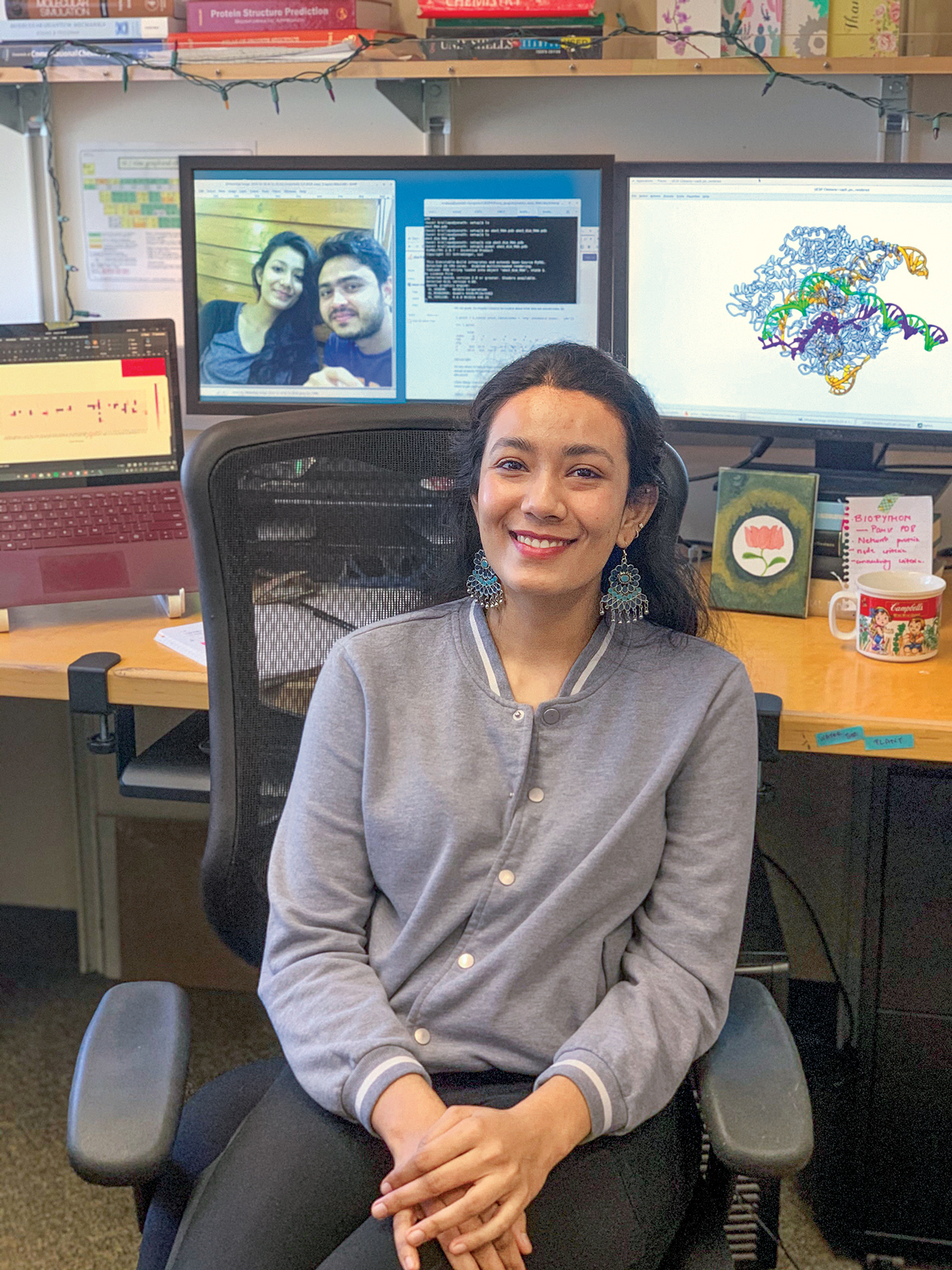
Every love story that I read growing up consisted of the protagonists in love, followed by a horrifying situation that separates them, and then the climax in which they go to great lengths to reunite with one another. Instead of the villainous parents, antiheroes, or dragons, the obstacle that separates me from my partner is my profession.
Many of us in academia face the two-body problem, and it intensifies as we climb the career ladder. Unlike its physics analogue that can be solved in a few equations, the academic two-body problem is harder to solve.
Graduate school orientation doesn’t tell you that marriage and graduate school are mutually exclusive. Nobody warns you that your love for science is going to threaten your actual love life. As graduate students we are expected to be migratory and unattached. That’s tough to ask of people in their 20s and early 30s because it overlaps with the prime age for settling down.
Being a woman in science adds an additional layer of complexity, as we are expected to willingly sacrifice the pursuit of a dream career.
We need to acknowledge this problem and evolve to provide a better work-life balance for the scientists of tomorrow. As I say this, with my boyfriend halfway around the world as a chemistry lecturer in India, I am seriously considering writing an optimization software that can provide a solution to my personal two-body problem.
I guess I will have to keep turning the pages to find out how my love story ends.
Dealing with rejection
by Patrick Larson, Texas Tech University, sixth year
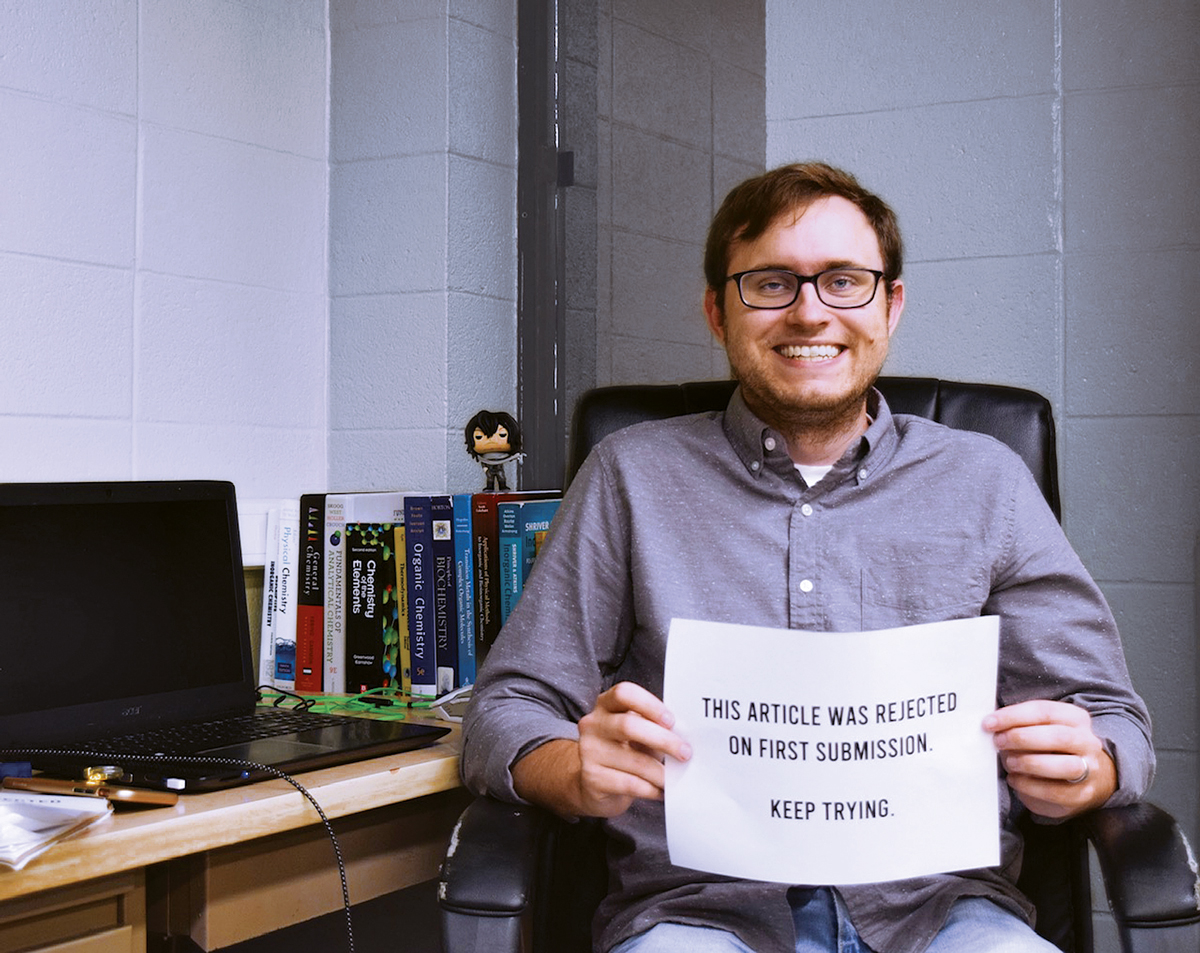
The second you hit submit on that first paper, it’s as if a piece of your soul has been sent into the ether to be judged. Your life’s work, blood, sweat, and tears, is sent to 2 (or more) shadowy figures across the world to be dissected. It comes as no surprise, then, that the response can be difficult to deal with. With the peer-review process, reviewer number 2 can seem like an almighty deity, cackling with a giant red pen and striking down your painstaking experiments that took months to perform. It seems like no matter how many experiments or how convincing the results, there’s always one more experiment that will make all the difference.
The most challenging part as a graduate student is decoupling this feedback from your work, taking a step back and realizing that while you are an anxious student with n number of problems going on, the person on the other side of the fence is, in fact, a person. In some cases, the reviews come back negative, whether out of merit, impact, or relevance. Even positive reviews can sometimes mean weeks of extra work. These can be beneficial learning experiences, if you’re able to critically view your work and improve your future projects.
Sometimes, a short memory is the only thing that can help when it comes to publishing. Shrug off the rejections and move on, whether it’s to a different journal, more studies, or a different project. Never let a rejection ruin your curiosity or your ambition.
Grad school weather forecast: Mix of clouds and sun
by Jesús Sanjosé-Orduna, Institute of Chemical Research of Catalonia, fourth year
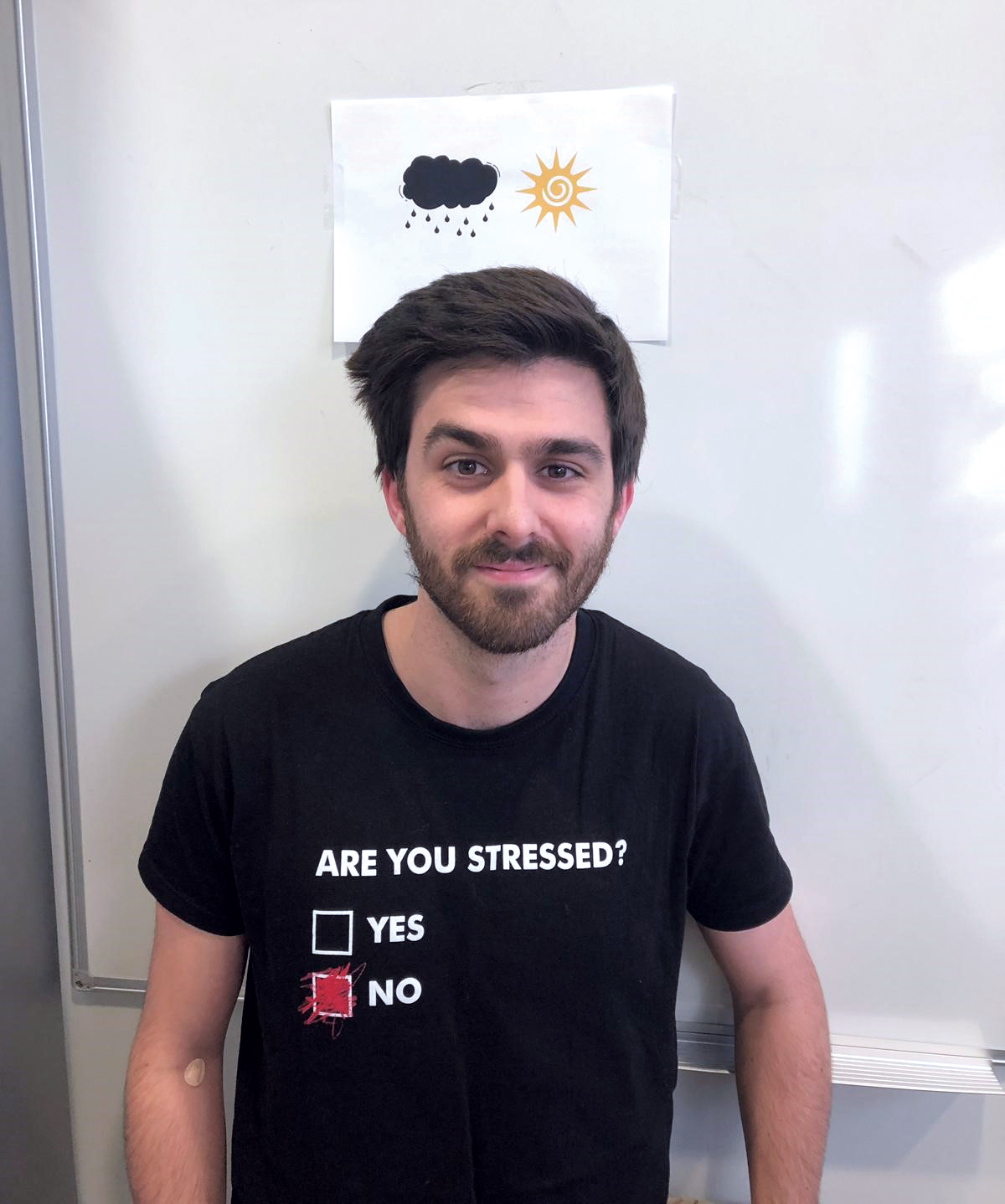
Starting my PhD studies in a new research group gave me a unique chance to learn new things. It was also the perfect scenario for taking every chemical reaction personally. Each bad result undermined my morale. Soon, everyone in the lab knew the results of my reactions just by looking at my face. A dark cloud started to follow me everywhere, precluding any traces of enthusiasm.
I spent the first year of my thesis in this gloomy mode, blaming myself for every reaction that didn’t work the way I expected it to. And when something started to work, my imposter syndrome repeatedly told me that it was just a matter of luck.
Eventually, with the help of my lab mates, those stormy clouds started to dispel. I started to realize one of the most important lessons I would ever learn in my thesis, and in my life: Be resilient. It’s not the successful result that makes you a better scientist, but how you behave during bad results, and how you overcome them. I’m not going to lie—when that important experiment fails, or I can’t reproduce a result, some sporadic clouds will pop up—but the forecast is gradually changing. Because after the storm, the sun always comes out.
One generous month a year
by Safia Jilani, Georgetown University, fifth year
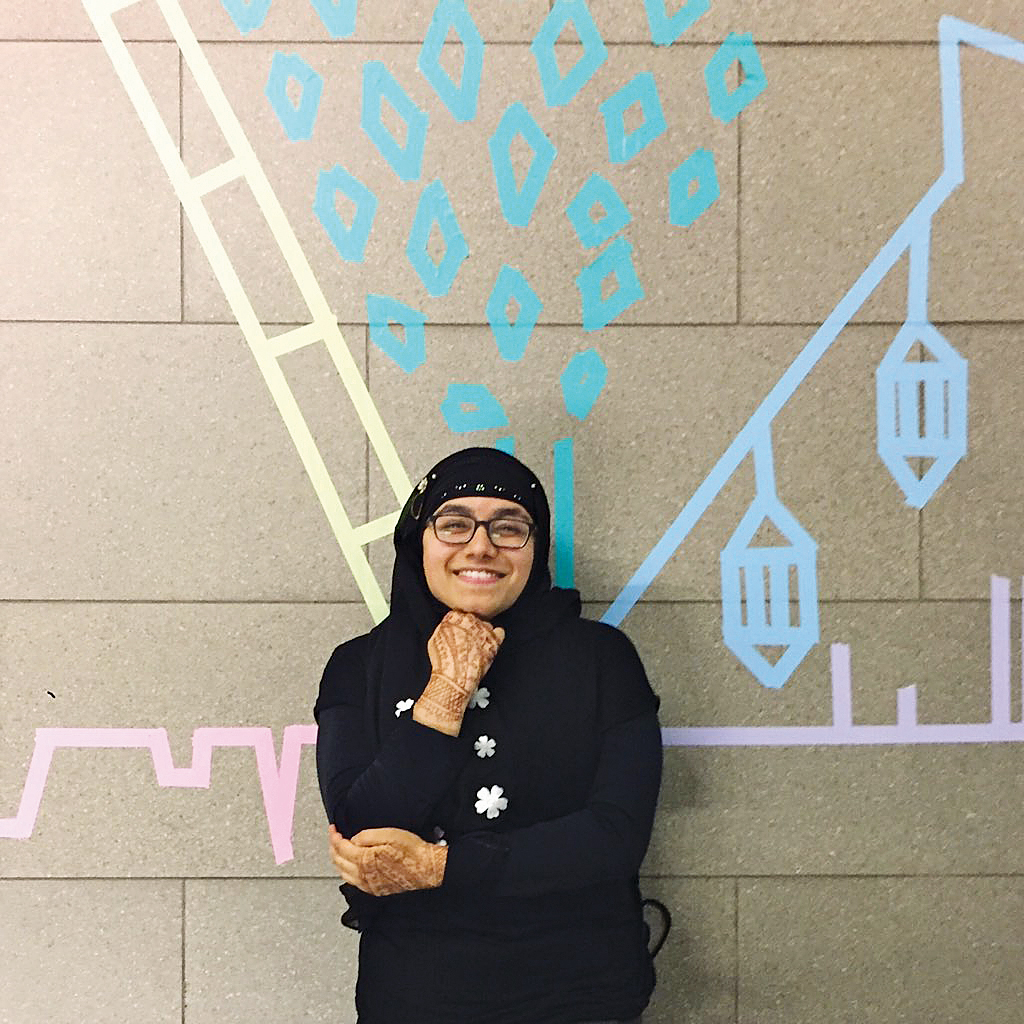
It is pitch black at 3:30 a.m. and I’m making breakfast. Shortly after, dawn comes and my fast starts. I pray Fajr (dawn prayer), pack my backpack, and walk to school. I arrive at the lab close to 5:00 a.m. The only sources of light are the sun slowly spilling through the window and a glowing string of lights that I’ve placed near my desk for the holiday. It is Ramadan, my favorite time of the year.
Ramadan is the 9th month of the Islamic lunar calendar, which runs roughly 10 days shorter than the Gregorian calendar. As a result, Ramadan “moves” each year about 10 days back, making every Ramadan a unique experience. This year, Ramadan spanned May to June.
As a graduate student, I live apart from my family and work long hours. These factors force me to reevaluate my Ramadan experience and how it changes my daily routine. I come to the lab near dawn, when I have the most energy. Since I am often alone during these morning hours, I must work with safer reagents or review literature. As the day progresses, I become more mindful of how I use my physical energy as to preserve my focus. I leave early to rest in the afternoon before breaking my fast and attending Taraweeh (Ramadan night prayers) at a local Masjid.
Ramadan is a time for renewal. I use it to reexamine my identity as a graduate student and scientist. As scientists, we have many ways to approach problems and imagine solutions, as I’ve depicted with lab tape in my photo. During Ramadan, I meditate daily and I contemplate how I want to grow as a scientist. I become more aware of how I mentor my undergraduate students and help my graduate student colleagues. I think about how I contribute to my lab community’s growth and how I can pay forward the kindness I’ve received in my training to others. I think of new ways to approach my research projects that I haven’t tried previously. Before the month is over, I take a positive action towards these reflections and goals.
Being a scientist is part of my identity as a Muslim, and being Muslim helps me reflect and grow as a scientist. Ramadan is a time that I get to interweave these parts of my identity more closely, in a beautiful and unique way. One of the greetings given during the month is, “Ramadan Kareem” (translated: [may you have a] “Generous Ramadan”). Whatever your contemplative practice or tradition may be, I wish you a generous holiday/tradition.
Breaking up with Pretty Bad
by Eleanor Castracane, University of California, San Diego, second year
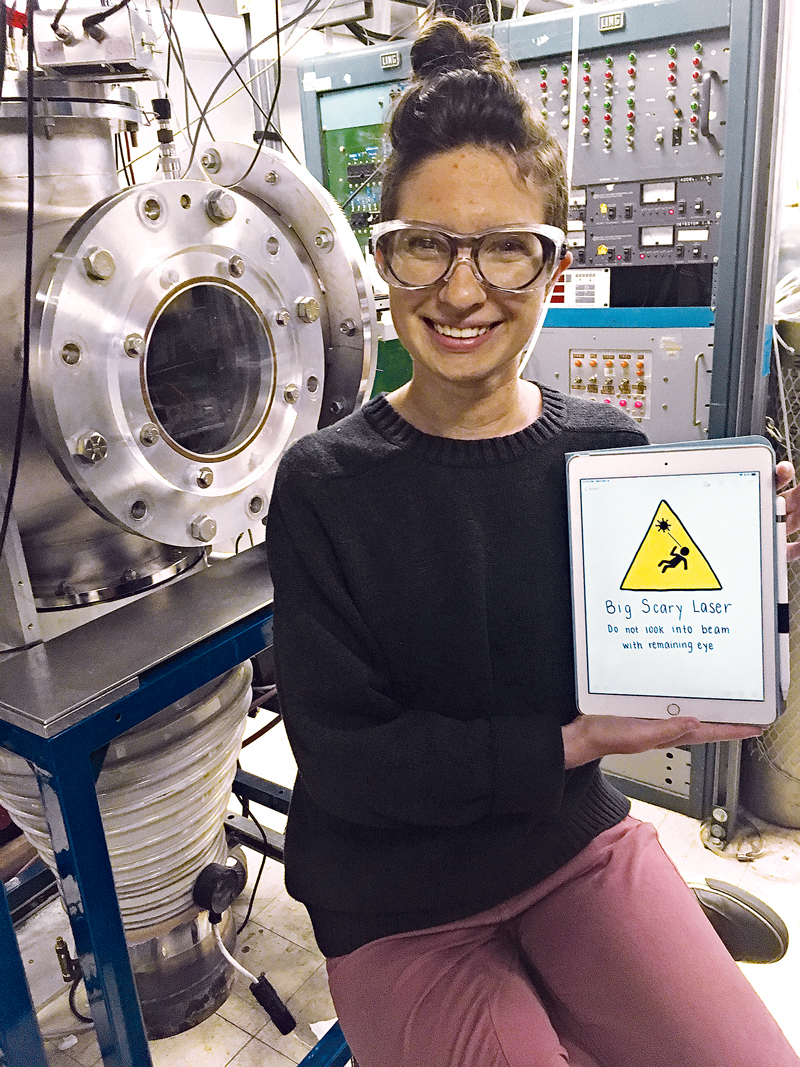
Shortly after finishing my first year of graduate school, I had an on-and-off relationship with a feeling I describe as Pretty Bad. Pretty Bad was brought on by my looming department exam and the weight of not wanting to disappoint my mentor. Pretty Bad stressed me out and deeply affected my motivation.
I didn’t worry about Pretty Bad; there had been times where I felt Kinda Bad, or Very Bad, or even Extremely Bad. Everyone feels Bad sometimes, I told myself. Pretty Bad was a passing feeling, and I felt Fine most of the time. I could handle Pretty Bad on my own. I didn’t need help. People who needed help felt Extremely Bad all the time, and that just wasn’t me.
Pretty Bad was soon joined by a nagging little voice inside my head. It told me I wasn’t smart enough, dedicated enough, hard-working enough, WHATEVER enough to be in graduate school. There were many times I contemplated dropping out because of this little voice.
When you look at it objectively, Pretty Bad sounded. . . pretty bad. But when you’re caught up in how you’re feeling it is difficult to examine those feelings empirically and prevent them from shrouding your thoughts.
I wanted to stay in my program, so I sought help. I saw a psychiatrist. I was diagnosed with Major Depressive Disorder, and I started taking antidepressants.
Bad isn’t relative. It doesn’t matter if I’ve felt worse in the past. It doesn’t matter how I feel compared to how I perceive other people feel. All that mattered is that I felt Bad—any type of Bad—and it affected me.
I implore all graduate students to take advantage of your university’s psychological services. We all feel Bad sometimes. You may not feel Extremely Bad, but that doesn’t mean Very Bad or Pretty Bad or Kinda Bad aren’t feelings someone can help assuage.
I describe this part of my life as Good. Good is motivated, and constructive, and independent. Best of all, Good doesn’t have anyone telling me I don’t belong in graduate school.
Grad School normal
by Deanna Montgomery, University of Michigan, fifth year
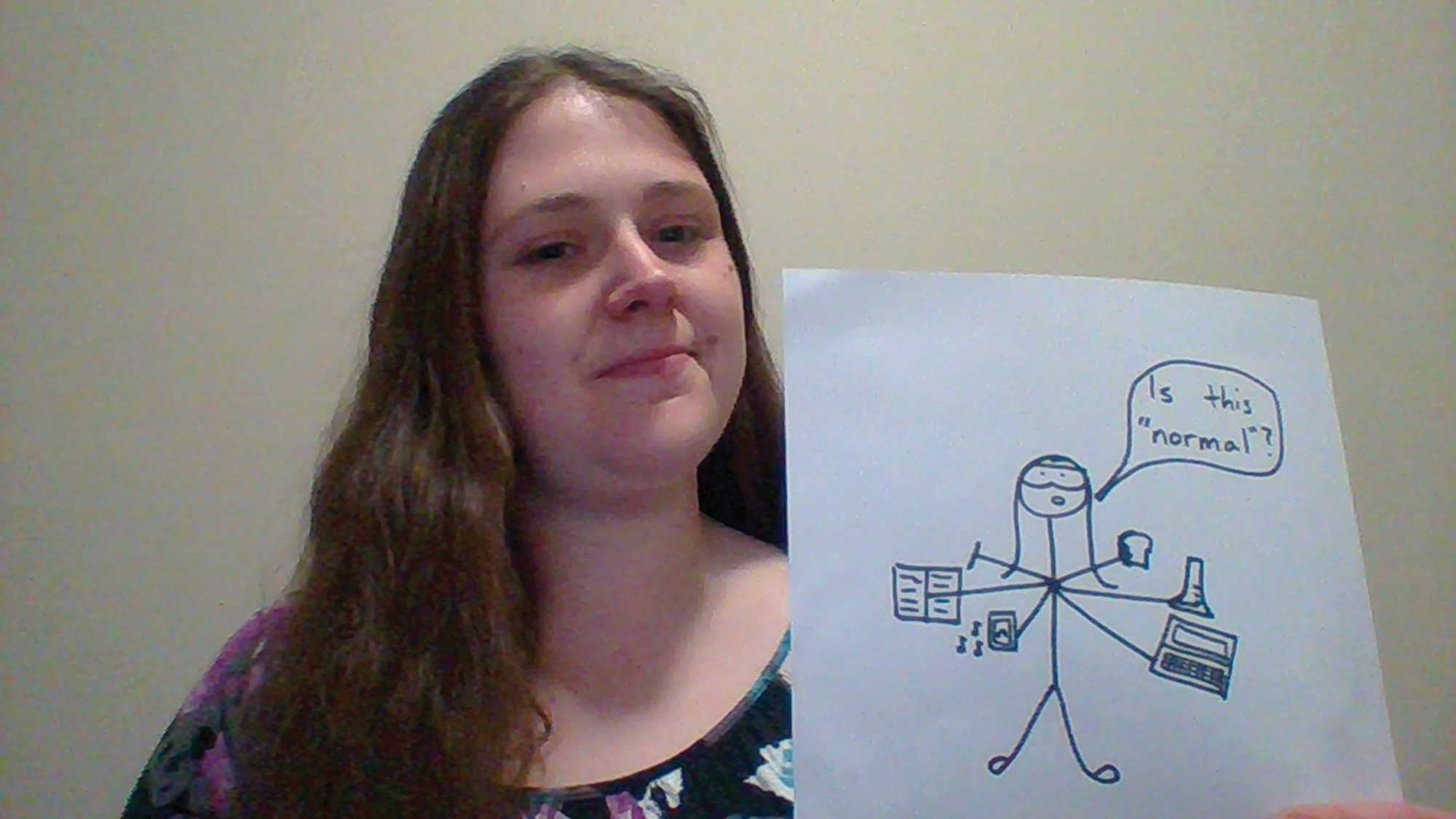
I hate this phrase. But I hear it reemerge in one of many conversations about struggling during grad school. “It’s not normal,” I say at first, referring to an environment where depression seems to be cultivated. Then I change my mind. “It shouldn’t be normal, but it is. It’s grad school normal.”
There’s a comfort to be found in the knowledge that I am not alone. I am not the only one in my circle of friends and colleagues who struggles within the ivory towers of academia. But there’s a grief to be found here, too. Why have I chosen to put myself in an environment that breeds these thoughts, these feelings, this negativity?
Graduate school hosts an environment unlike any other. In some ways, I count this a blessing. I’m participating in cutting-edge research and have access to resources I wouldn’t find elsewhere with a community of people who share my daily struggles. But in other ways, the uniqueness of this setting can be its greatest curse. I still haven’t figured out how to explain to my family what exactly it is that I do, and I get caught in “what ifs” when I talk to friends who chose a different path, have a “real job,” and are making a real wage.
Still, there’s something to acknowledging the way things are, even while wishing they were different. Perhaps admitting that the patterns and practices of academia are not always healthy ones is the first step toward changing them.
Grappling with the decision to leave grad school
by Ariana Remmel, University of California, San Diego, third year
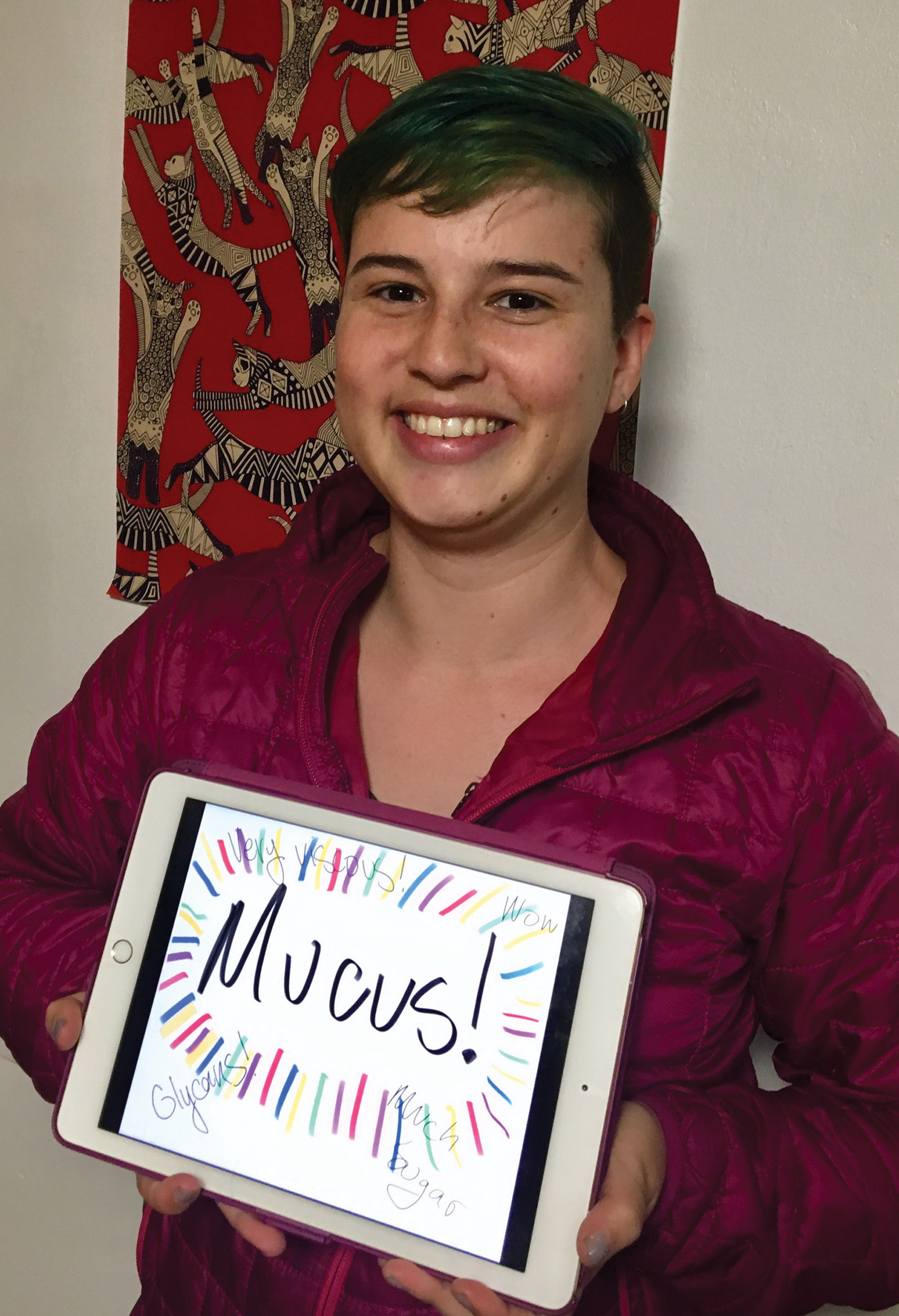
I almost quit my PhD program last spring. Despite passing my second year exam and making progress in my research on cervical mucus, I was unhappy with where my life was going. I knew that I didn’t want to go into industry, but the more time I spent in academia, the less appealing that sounded, too. Why work for a PhD if it wasn’t going to open doors I wanted to walk through?
Ultimately what it came down to was this—I hated going into lab. Instead, I wanted to write and teach. I love finding new and interesting ways to make chemistry accessible to a diverse audience. I sought out every opportunity to communicate my research to the public. My intense desire to share my love of science was getting in the way of me actually doing the work. Something had to change.
That was when I discovered that you can make a whole career out of science communication. We need more trained scientists bridging the gap between active research and the lay public—and I was already developing the skill set to do just that. But what does it mean to pursue a career in communication when I am being evaluated solely on my research progress? Developing these “soft” skills has certainly made me a better scientist, but I still have trouble justifying the time away from the bench to my advisor. I wish grad school culture did a better job of supporting students who want to pursue alternative careers.
My scanner ate your homework: The trials and tribulations of TA-ing
by Mai Kim Tran, Rice University, third year
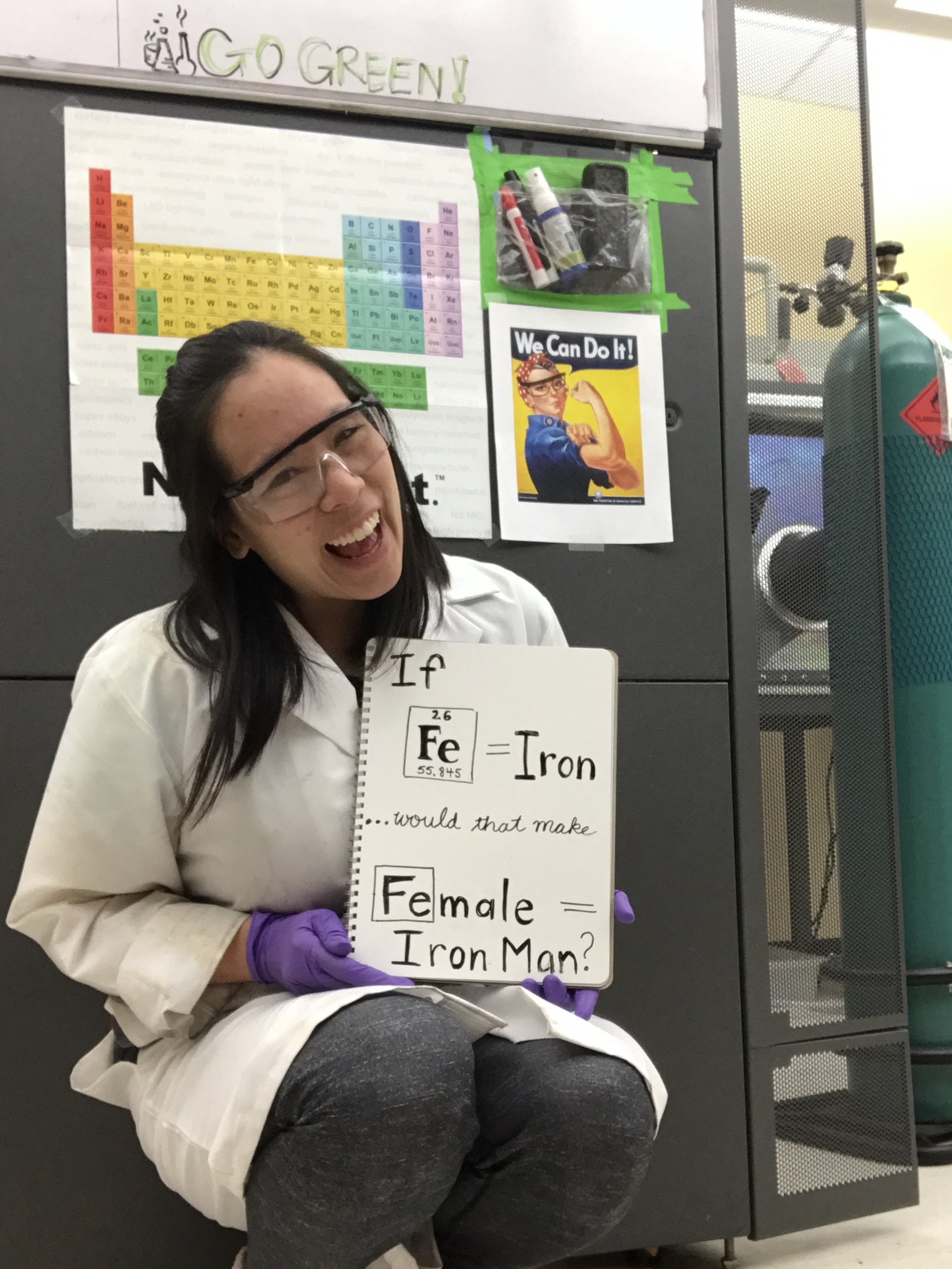
After a nearly hour-long battle with a stubbornly capricious malefactor (that is, the scanner), I finally scanned 244 pages of undergraduate and graduate homework, stained red with blood (just kidding, with red pen, I swear), with only a few wrinkled casualties and seven paper jams.
During my first teaching assistant session, I was a nervous wreck. Self-conscious about my presentation, I stood at the front of the room before undergrads one to four years younger than me, and yet I was expected to be the authority on the subject when really I was in the same place just last year.
I was already a bit irked that only one or two of the handful of students even looked at the homework problems prior to coming. From what I understood, however, they had just finished an exam in that same class and had two more the following day. Been there, done that, I thought. I should be gentle.
But instead of being nice, I realized I was simply being boring and unhelpful. As I spoke through each problem, I would say, “This problem is fairly straightforward. You all will find what you need from section xyz in chapter 4 of the book.” Then I’d give them a link to a helpful or interactive website that I liked, but I wouldn’t go into deep detail. I thought I was helping by telling them where they could find and figure out the problems, but I realized the whole session was vague and uninteresting.
I became the very TA I disliked when I was in undergrad.
Key takeaways for future sessions? I came up with five: Know your stuff. Define your goals. Know your audience. Engage in interaction. And be a human. Application of this theory to the real world is TBD.
Finding my voice
by Rachael Hall, North Carolina State University, fifth year

The most difficult thing I’ve had to do in grad school so far is find my voice. I’ve always been a smart kid. I got good grades and jumped through every hoop put in front of me. I thought grad school would be the same. I was so, so wrong. I didn’t realize that while being smart may have been what got me into grad school, it wasn’t going to be what kept me there. Because I was a quiet, anxious kid who kept to myself, interpersonal stuff was always hard for me. I didn’t realize that deficiency would catch up with me in graduate school. I had to learn to communicate my needs, whether that was getting help with experiments or getting help resolving conflicts with coworkers. I had to learn to confidently communicate and defend my ideas. I had to learn to stop apologizing for putting time and energy into mentorship of others and science communication. I had to learn to speak up as a woman, LGBT person, and person with anxiety because otherwise my voice wouldn’t be represented. I had to learn to speak up because I have important things to say. When I started grad school, I didn’t realize the vulnerability required for me to become the scientist I wanted to be, the person I wanted to be. But on this side of the experience, I’m grateful for the lessons.
Unconsciously done
by Miranda C. Andrews, Texas Tech University, fifth year

Implicit, or unconscious, bias is getting a lot of press. As scientists, we often consider ourselves as experts at placing our biases aside and simply being objective. However, in the world of publishing—you know, the way we gauge our success and value—we as the science, technology, engineering, and mathematics (STEM) community have done very little to prevent bias from affecting the outcome of scientific work. The review process is single blind: Reviewers know the names of the authors of a given submission and the institutions they represent. This doesn’t sound too bad, except the whole point about implicit biases is that we don’t realize they’re affecting our judgments of others. This means that bias can exclude authors according to their gender, perceived ethnicity or nationality, or institution without reviewers even realizing it.
My first paper was published recently. After nearly a year of submitting, revising, and submitting to different journals, I finally decided to change the format of my name, giving it the appearance of being masculine. We changed other variables, including the journal that we submitted to, but I can’t help but wonder what part my name played. As a woman scientist, implicit bias in the peer review process likely affects me negatively. The STEM community needs to be aware of the impact of implicit bias before we can start fixing the leaky pipeline. We need a double-blind review process, even though some people will be held to a higher standard than they’re accustomed to. How many pioneers have we discouraged? How many more are we willing to lose?.
When you are blind and in grad school
by Ashley Neybert, University of Northern Colorado, second year

The hardest part about being a blind student in graduate school is the inaccessibility I face everywhere. I part crowds with a wave of my hand ... OK, maybe it’s my cane, but people scatter like mice that just saw a cat either way. Searching for the copy room or projector lounge can feel like a scavenger hunt as I walk through hallways marked only with room numbers in braille, like room 175.
In class, “This arrow means the molecule pictured goes here,” my professor says. Without a tactile diagram, I can guess we might be talking about a molecule going into an enzyme active site, or maybe it’s a mechanism. The exam is tomorrow and I still haven’t gotten any of the braille documents I asked for, so it’s another test of learning everything I can about the few things that were clearly named in lecture.
When taking the test, I have to keep things in my head as my reader reads my exam like it’s in another language. “There’s a funny thing that looks like a fish above a big C” or “pie-rid-nye-um eye-own” are common things read to me on exams, and I must translate that in my head to “α-carbon” and “pyridinium ion” before I can even attempt solving the problem.
While it might seem like everything is stacked against me, these kinds of hurdles have made me a natural problem solver, which in turn makes me an even greater scientist, as I will never stop questing after the answers to all of life’s problems.
Making complex waves
by Matt McTaggart, Royal Military College of Canada, second year

Like most students, graduate work is far from my only responsibility. Officially, it’s not even my primary responsibility. Because I am employed full-time, university policy dictates that I enroll in a part-time Ph.D. program. Of course, I don’t stop being a chemist when I’m away from the lab any more than I stop being a parent when I’m away from my kids. I inhabit my many and varied roles simultaneously in a kind of superposition. I am a student, Air Force officer, classroom instructor, father, husband, brother, son, lab supervisor, ammunition specialist, diversity advocate, writer, mentor, and trainee. Whichever version of myself I collapse into at a given moment depends entirely on how and where and with whom the interaction occurs. In other words, I am a quantum chemist.
“Part-time” is an administrative and not a practical distinction, but the consequences are no less real. Just as my part-time label excludes me from accepting the scholarships I need to pursue my research, other students’ full-time label excludes them from accepting the work they need to pay their rent. Constraints originally intended to improve outcomes are leading to anxiety, burnout, and program attrition when they fail to address the student as a coherent, complicated whole. The classical model of student life was useful when the academic career path and those who sought it were nearly uniform in background and outlook. It is past time for institutions to embrace the constructive interference arising from students making complex waves.
Finding motivation amid challenges in Nigeria
by Akeem Abefe Aliyu, Ladoke Akintola University of Technology, fourth year

As a graduate student in a developing nation like Nigeria, I face lots of challenges. My research deals with extraction, characterization, and biological activities of plant volatile compounds from aromatic plants grown in Nigeria. Hindered by an unstable power supply, I have to monitor the stability of electricity to carry out my experiments. This has extended my course of study.
I also don't have access to necessary analytical instruments like ultraviolet spectrophotometers and infrared, mass, and nuclear magnetic resonance spectrometers. I overcame these challenges by collaborating with research institutes such as Nigeria's National Research Institute for Chemical Technology, where such resources are available.
There is no research body or foundation in place that provides grants, scholarships, or loans to facilitate the successful and timely completion of my program. This has required me to spend huge amounts of money on tuition, accommodations, and travel to both local and international conferences. For example, I had to sponsor myself to attend the ACS national meeting in New Orleans.
I also face the challenge of finding employment after graduation due to the limited number of industries and research institutions where I could apply my acquired skills.
Through these trying periods, I almost lost interest in the program, but I was fortunate to attend an ACS symposium organized by the ACS Nigeria International Chemical Sciences Chapter. I presented a poster and—to my surprise—won the best poster presentation for the M.Sc. category. Winning the award has motivated me to keep moving forward. I hope that the Nigerian government will provide adequate infrastructure and prioritize the funding of education to help students like me achieve their goals.
Holding back tears
by Name withheld by request, second-year graduate student in biochemistry

My old graduate student mentor will get his Ph.D. on Wednesday. When I saw the announcement, I was frozen. It wasn't until I said the words out loud, over the phone to a friend on my way home, that the tears came. I dodged strange looks shooting at me like bullets from passersby on the busy city street. The tears came again while I was in the lab, mumbling to my boss about military homecoming videos as the reason for the tears on my cheeks. And then the tears came again when I was at home, lying on the carpet, staring at the ceiling as a thunderstorm roared outside. And then they came again when I was 10 miles into a 16-mile run; I had to stop because I couldn't breathe.
My harasser will get his Ph.D. on Wednesday.
I did everything right. I reported, I spoke up, and I made sure that he would never mentor another undergraduate. I won my Title IX case.
And yet.
My attacker will get his Ph.D. on Wednesday.
I thought I did everything right. I fought for myself. I "won" Title IX.
And yet.
Here I am, a year later, still as shattered as that day, always looking over my shoulder, never the same as I once was.
He will continue with his life as though nothing ever happened.
And yet.
The tears still come for me.
A note from the writer: How do you move on when the world seems to stop for you but continues to spin for the rest of the world, harasser/attacker included? How do we continue to pursue our passions when so much of what we do is a constant reminder of what we have tried to put behind us? How can we not give up when a terrible person seems to suffer no lasting consequences? Whether or not we choose to speak up or press charges or report incidents, how can we continue with the aftermath of broken bodies and hearts and minds? I truly don't think I'm alone. I want to express to other men and women who have been broken by workplace harassment or assault that they are not alone and that we can move forward, together and stronger.
The lukewarm chemist
by Mei Yi Leow, University of Tasmania, fourth year

I know this guy. Let's call him Bill. Like me, Bill is a grad student in chemistry. His favorite T-shirts use "science" as a verb, and his spirit animal is the Large Hadron Collider. When he's not in the lab or reading Journal of the American Chemical Society as-soon-as-publishable articles, he's working at science fairs, delighting children with flaming gummy bear demonstrations.
I worry that I'm a bad scientist because I can't replicate Bill's enthusiasm. I thought I loved this work. But as in an ill-considered marriage, the infatuation has faded, and we're just staying together for the thesis.
Some call grad school a clarifying experience, a "try before you buy" for research life. It's normal to switch careers, so why am I racked with guilt for even thinking about leaving? Although many people aren't madly passionate about what they do for a living, I feel obliged to leave simply because I'm not a Bill.
Perhaps it stems from the duality of a Ph.D. It's a job in that you exchange your services as a researcher for money. But by calling that salary a scholarship, you're conditioned to view this sub-minimum wage "gravy train" as a great personal favor. Like you have no place here if earning a Ph.D. is anything less than a dream come true.
Does that make me selfish for staying in grad school? My space could have gone to someone better. I could have paid for my sister's tuition or bought a home with my partner with the money saved from a real salary. How much must I love it to be a worthwhile grad student?
So what are you up to now?
by Brittany Trang, Northwestern University, second year

Sometimes the most annoying thing about being a grad student is that "student" is a misnomer. Grad school is so different from the typical school experience that family and friends can't wrap their heads around what we do.
There are about five basic misconceptions that come up in almost every conversation I have about my life:
1. So you're getting your master's?
Saying "I'm in grad school" sounds less pretentious than "I'm getting my Ph.D.," but it kind of hurts every time I have to explain straight-to-Ph.D. programs and terminal master's.
2. You're done with classes? When are you graduating?
"Oh, I'm done with classes, but I have four more years of research," I say, smiling like this is a campaign ad and not a perpetual reminder that I AM NOT GRADUATING ANYTIME SOON.
3. What are you doing this summer?
*Points at the desk my lab mates and I labeled "Cabo" with a sticky note*
I'm working. I'm working. I'M WORKING.
4. Wait, why do you call it—
BECAUSE IT'S A JOB.
I'M SORRY FOR THE ALL CAPS,
BUT THIS IS VERY IMPORTANT FOR YOU TO UNDERSTAND ABOUT MY LIFE.
I AM NOT ACTUALLY A STUDENT.
I GO TO MEETINGS AND WORK YEAR-ROUND AND HAVE A BOSS.
JUST LIKE YOU.
ONLY I WORK WAY LONGER THAN 9–5.
AND WEEKENDS TOO.
BUT I'M UNDERPAID,
BECAUSE I AM TECHNICALLY A STUDENT.
I FEEL LIKE THIS IS UNINTENTIONALLY TURNING INTO A POEM.
5. Wait—they pay you?
Yes, thank goodness. No, I'm not mooching off my parents. No, I'm not going further into debt. No, I'm not penniless (technically). But no, I'm not saving for retirement either.
6. And before you ask again (bonus!), NO, I'm not graduating anytime soon.
Am I happy?
by Kira Podolsky, University of California, San Diego, third year

I walk by a mural of a flowchart that starts with this question. It's on the way from my parked car to my lab.
I see it every single day:
"Are you happy?"
I am anxious because my experiments failed again yesterday and I have a meeting with my PI today. And crap, I forgot I have homework to do for a class I don't really need but is required by my National Institutes of Health training grant. Whew. I'm going to go with no, I'm not happy.
So on the mural, I follow an arrow with a "no" next to it that leads from the first bubble to the next one:
"Change something."
What can I change? I could go to lab more. I could master out of the program and find a job. I could chase another dream.
But I do go to lab every day possible without losing my sanity. And I have worked so hard to get here. I can't just quit. This has been my dream since I was a kid.
I'm where I want to be.
I am happy. I am happy. I am happy.
I follow a different arrow, the one marked "yes":
"Keep doing what you're doing."
I walk past the mural. Until tomorrow.
Dreaming of a future in chemistry
by Antonio Tinoco Valencia, University of Rochester, fourth year

When I began studying chemistry at East Los Angeles College, I never imagined I would pursue a doctoral degree. Being an undocumented, first-generation Latino college student from a poor, working-class immigrant family, I faced many barriers throughout life and my undergraduate education that made me feel many of my goals were simply out of reach. But I never let those barriers deter me.
I vividly remember the day former U.S. president Barack Obama announced the Deferred Action for Childhood Arrivals (DACA) program: I felt a flame of hope being ignited. With DACA, I applied and was admitted to the Ph.D. program in chemistry at the University of Rochester.
Soon after starting my graduate career, I faced a whole new set of challenges. I was hit hard with impostor syndrome, especially after publishing my first paper and being awarded graduate fellowships. As the only DACA recipient in the entire graduate studies department, I felt alienated and that I had no one to talk with.
When the decision to rescind the DACA program was announced by the Trump administration, I felt that everything that I worked so hard for was going to be taken away. These stresses took a toll on my mental health; I developed anxiety, and I could no longer get a good night's sleep. It wasn't until I began to openly discuss what I was going through with my friends and professors, along with practicing meditation through a class offered at my university's health center, that I regained control over my mental well-being.
Regardless, my future and the futures of all DACA recipients remain uncertain. But my graduate student experience in chemistry has taught me to embrace the challenges that life (and science) throws at you and to never fear the unknown.
Master’s degrees matter
by Lauren Ebersol, Pennsylvania State University, third-year master's student

Graduate students have a lot on their plates. They are expected to do exceptional research, publish frequently, take classes, teach, train new students ... the list goes on and on. Eventually, the primary tasks become finding a job and graduating. An issue that can affect these fledgling chemists is the lack of information and support for those facing the decision between master's and doctoral degrees. The availability of more information about this decision might eliminate the population of graduate students without clear career goals who stay in grad school because they see no other option. In my experience as a chemistry graduate student, a master's degree is viewed with contempt even though there are a significant number of jobs in chemistry for applicants with a master's degree. Yes, these are frequently "limited" to jobs in industry—another idea that is often viewed with contempt by those in academia—but that does not mean they are lesser. There is limited information in graduate school about jobs in industry because everyone exists in an academia bubble. Professional societies like the American Chemical Society are trying to combat this, but more support needs to be available at the university level. In addition to that, more support should be provided at the undergraduate level to prepare students for the graduate degree that fits their needs. With changes like this, graduate students could focus on their present responsibilities, knowing that they can be more confident in their future career, whenever it comes.
English to Singlish
by Craig Fraser, National University of Singapore, fourth year

"May I have a can of Coke?"
"Can cannot; bottle can."
"Huh?"
Because I'm a native English speaker, moving halfway around the world to Singapore from Scotland to pursue my Ph.D. should have been a breeze. Singapore's primary language is English. Science, generally, is communicated in English. No problem, right? However, in Singapore there are three mother tongues—Chinese, Malay, and Tamil. Naturally, family and friends of the same race will converse mostly in their own mother tongue, but how do friends of different races communicate? In English, right? Not quite! In Singapore they have their own dialect, "Singlish," which is a mash-up of all mother-tongue dialects with English. Not only that, but even Singaporeans will admit that their use of English is rather lazy: Sentences are shortened as much as possible. However, redundant words are often added to the end of sentences. Add to that the fact that a lot of their use of English comes from almost literal translations, or lack thereof, from the mother tongues. For example, there is no direct translation in Chinese for "yes," so other affirmative words are used—"can" is very common. To the unfamiliar ear, Singlish can be a crazy jumble of words that makes very little grammatical sense. Learning this new language was one of the biggest challenges I faced at the start of my Ph.D. Combine that with the clash of accents, and I was repeating myself a lot when asking for something as simple as a can of Coke!

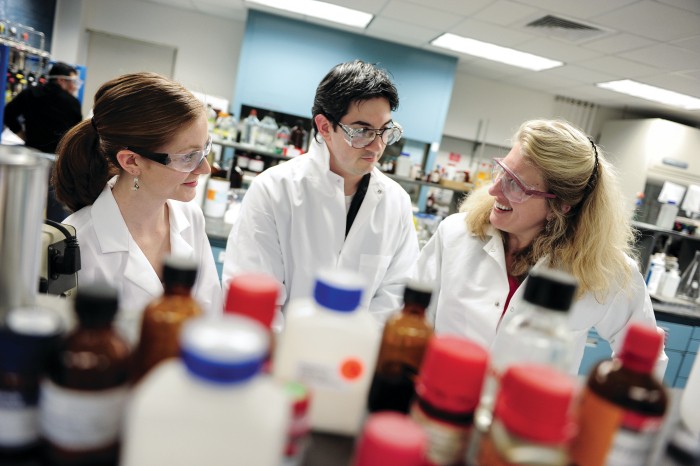
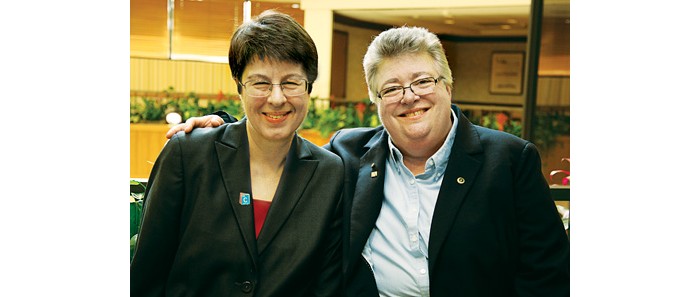
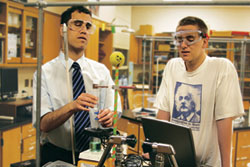

Join the conversation
Contact the reporter
Submit a Letter to the Editor for publication
Engage with us on Twitter